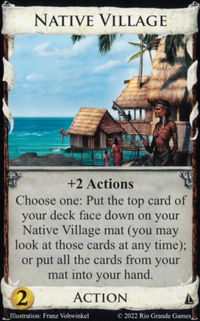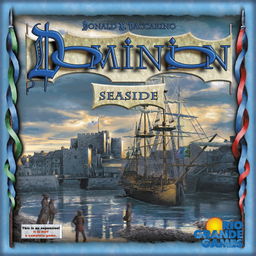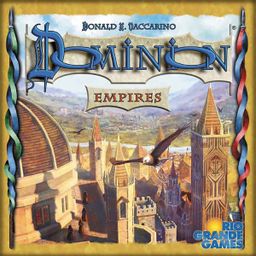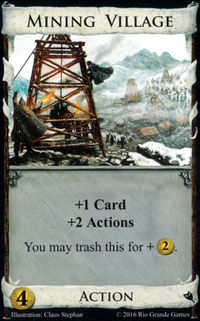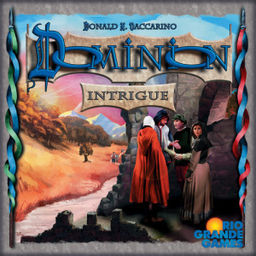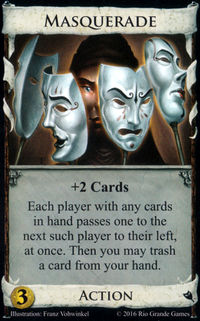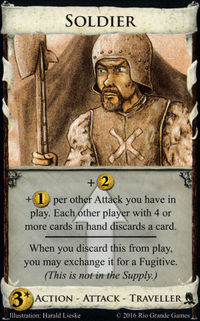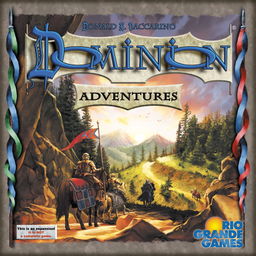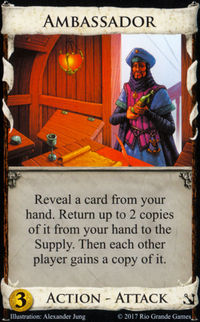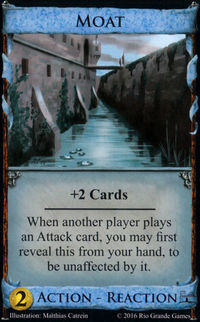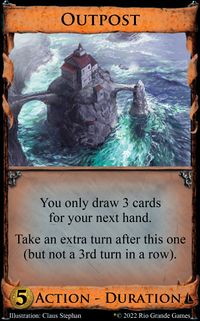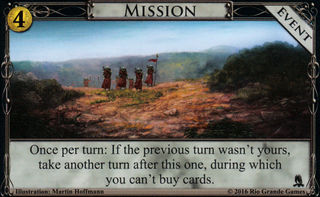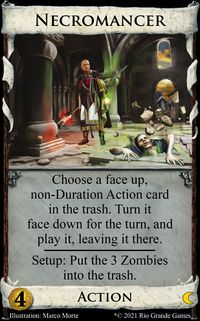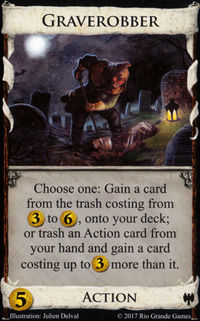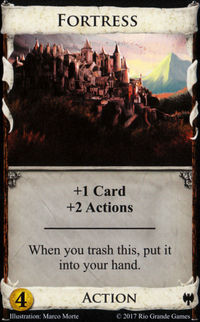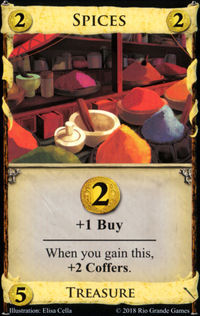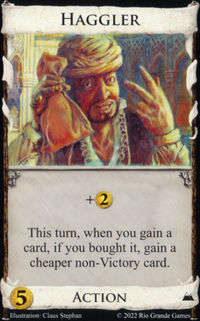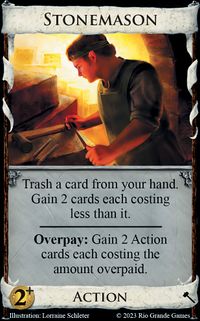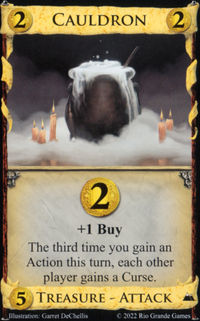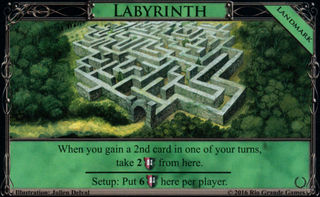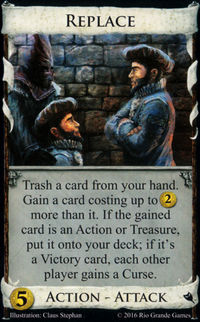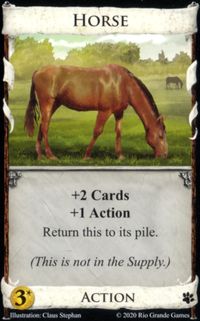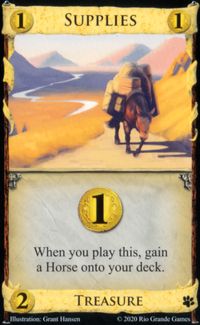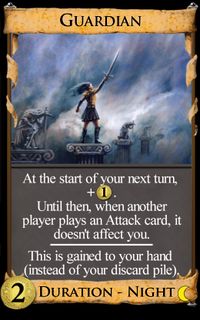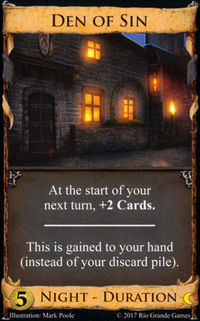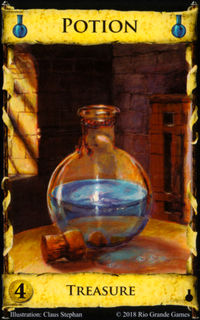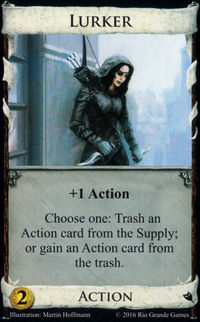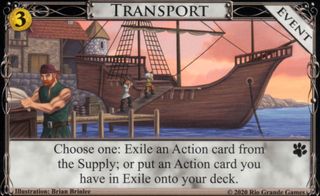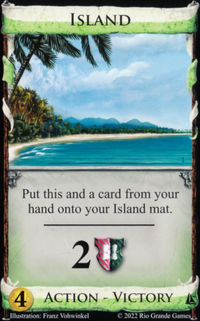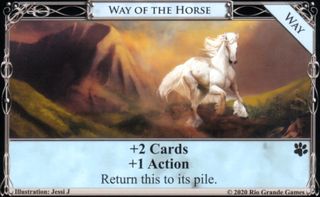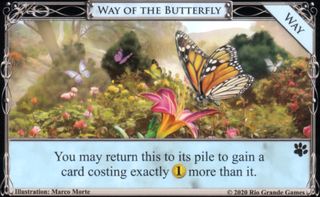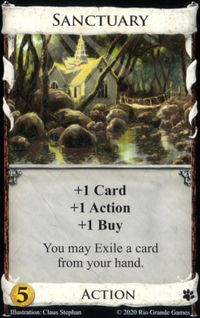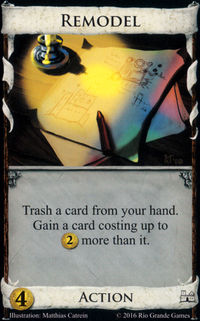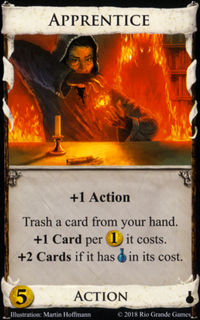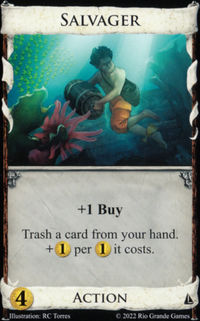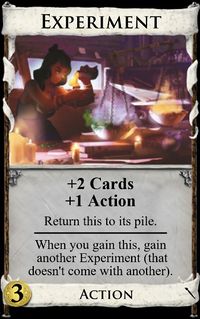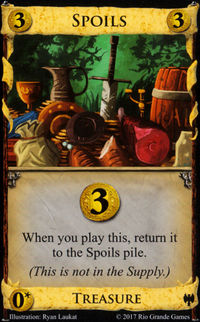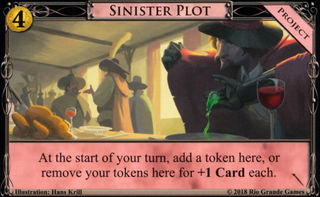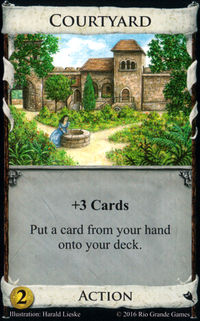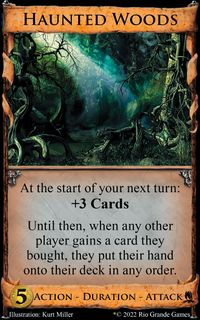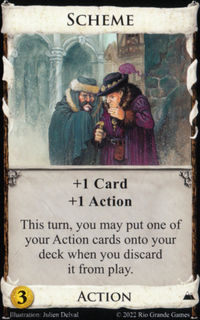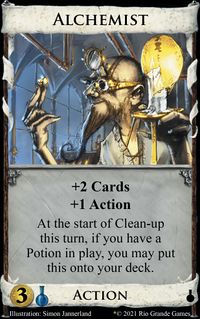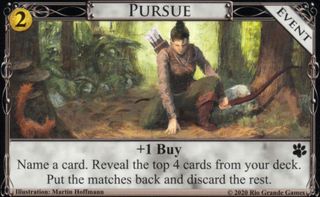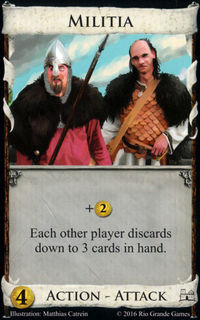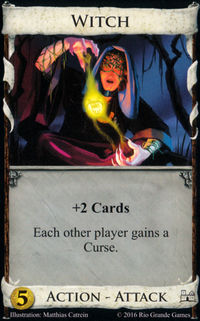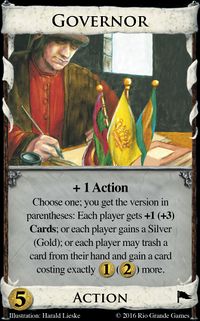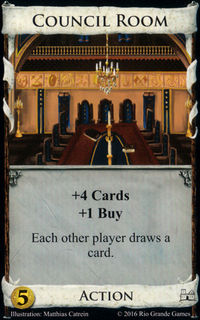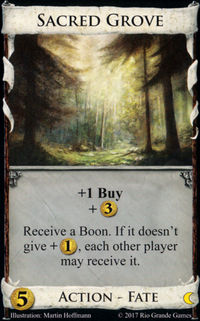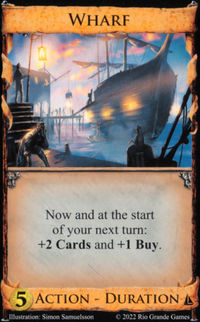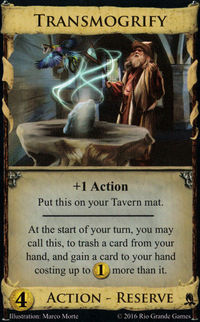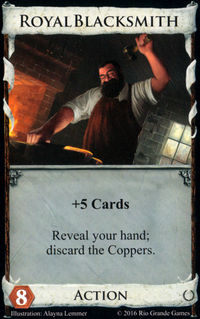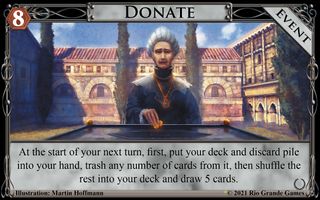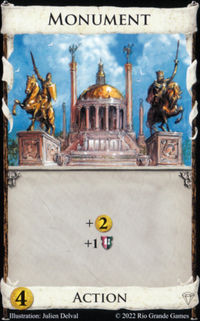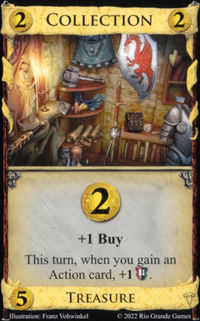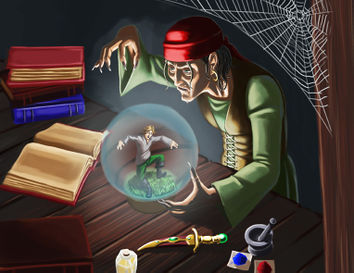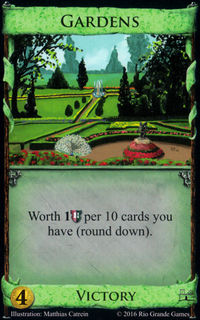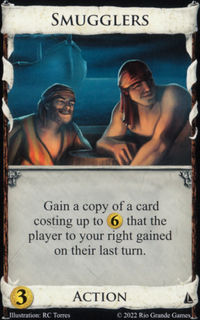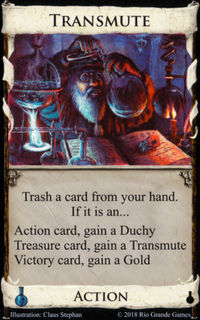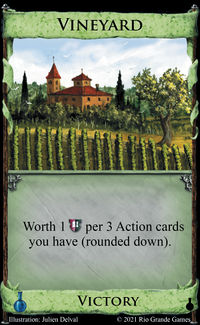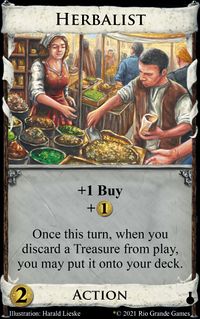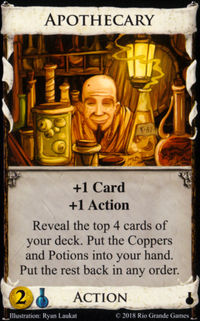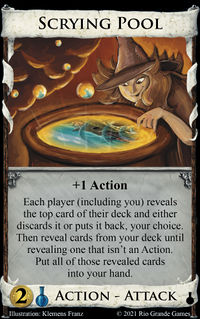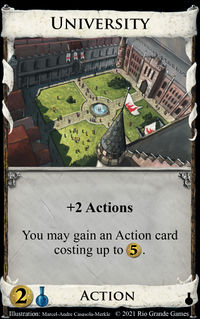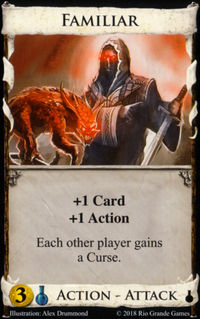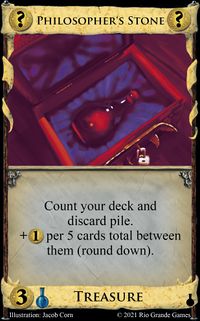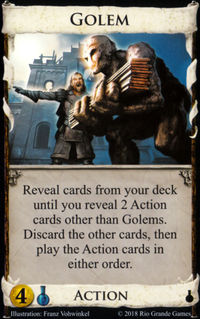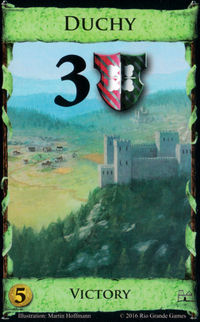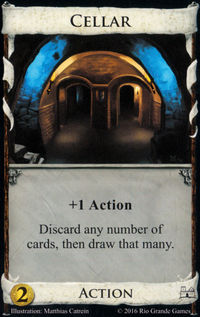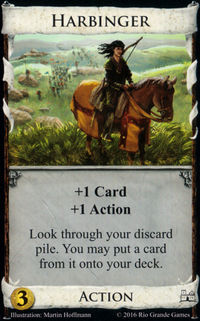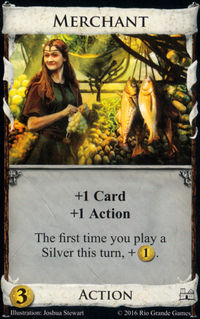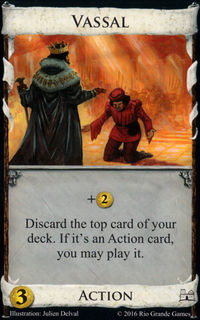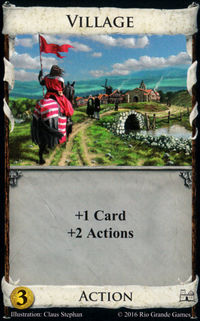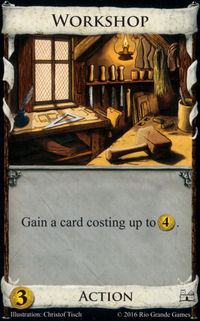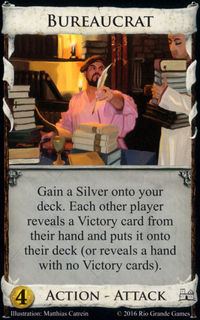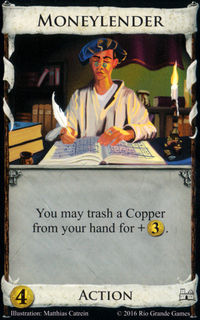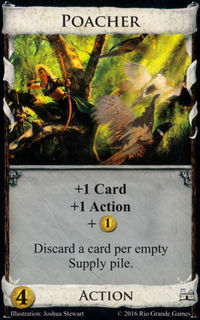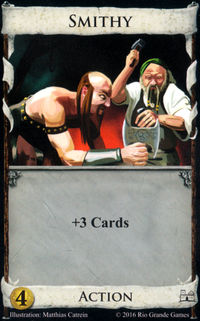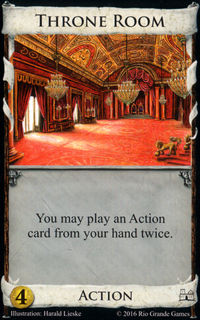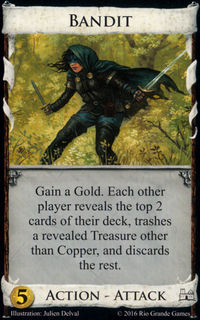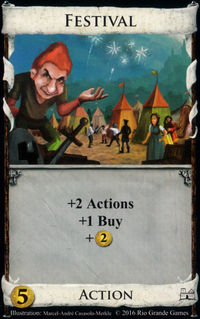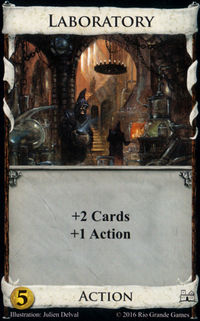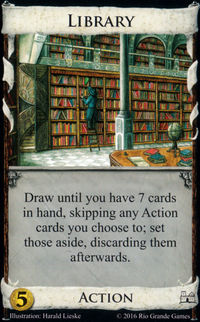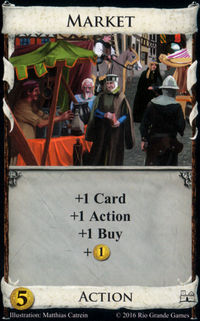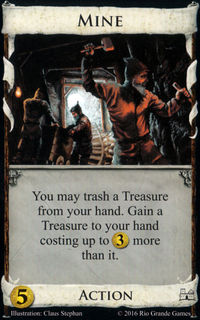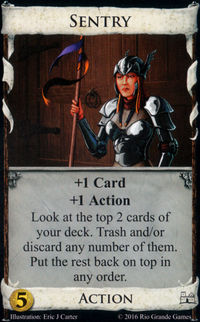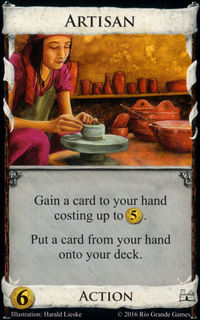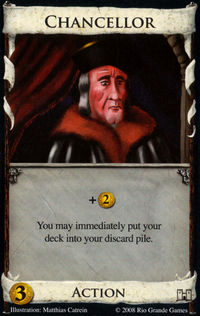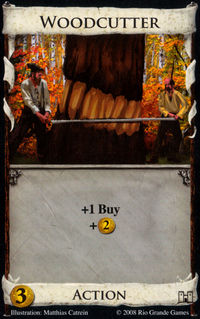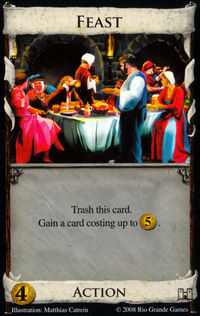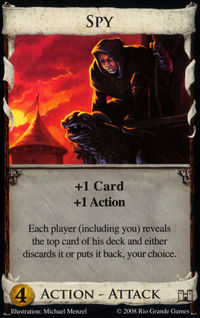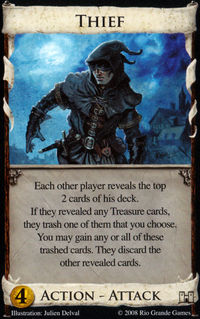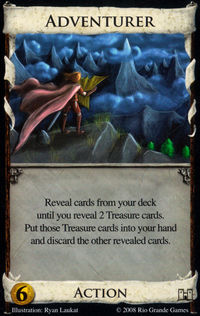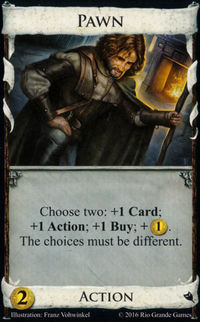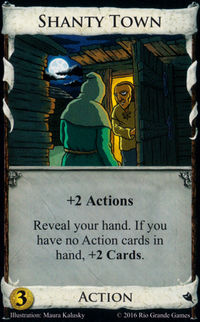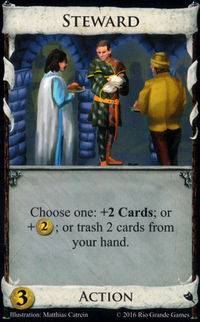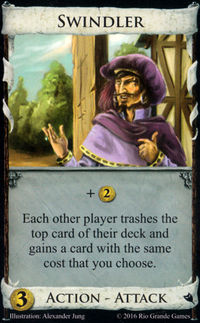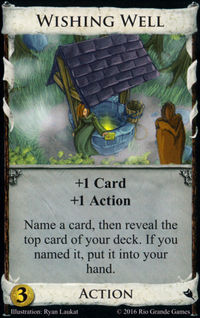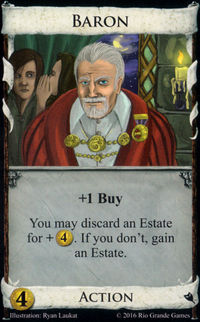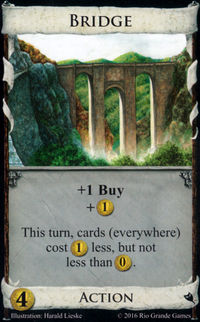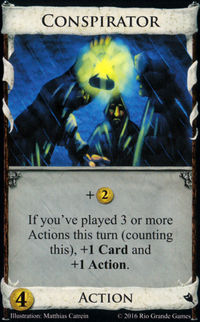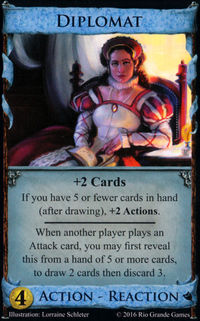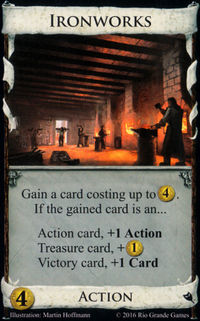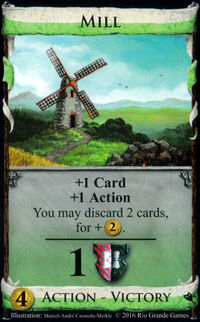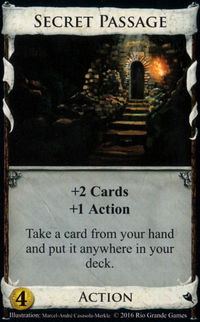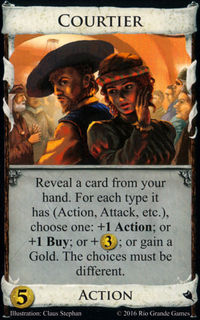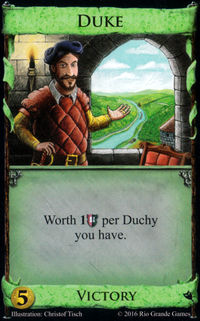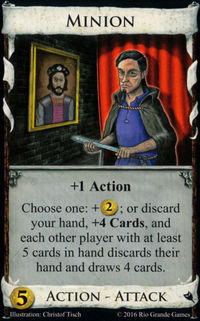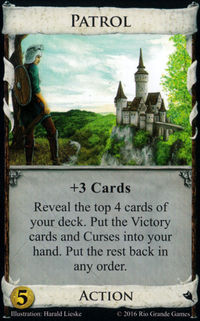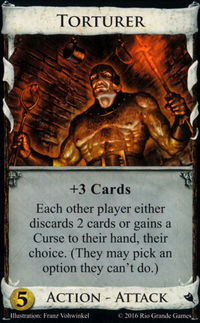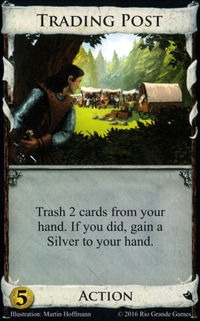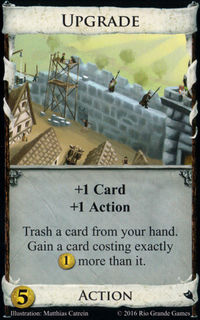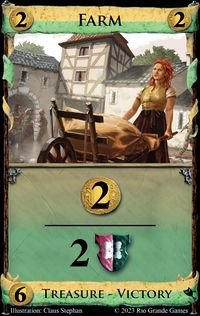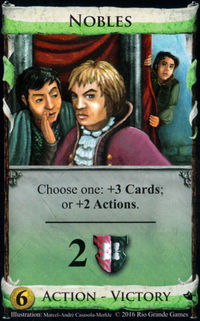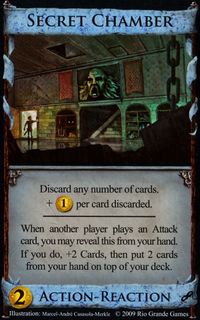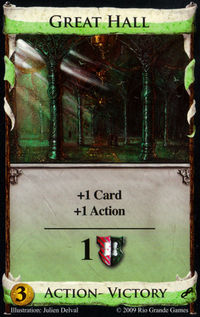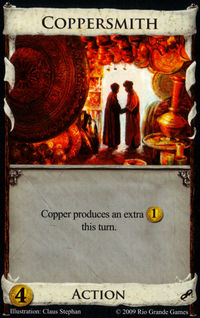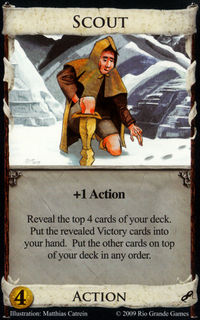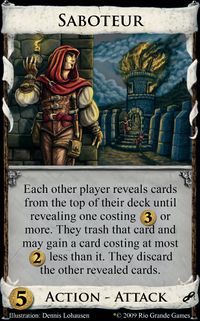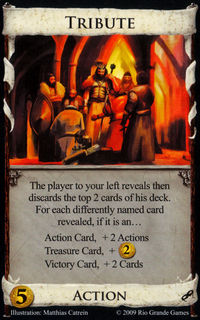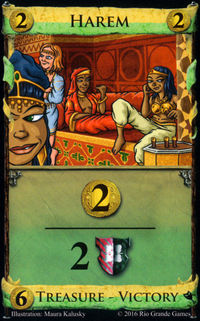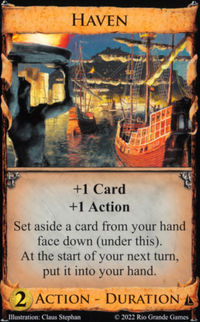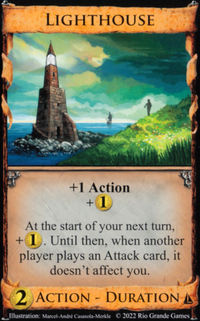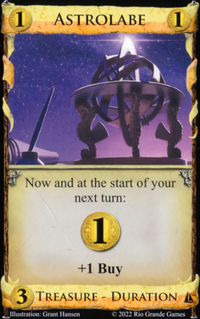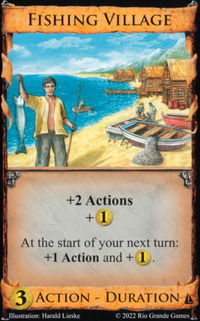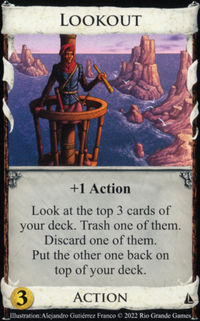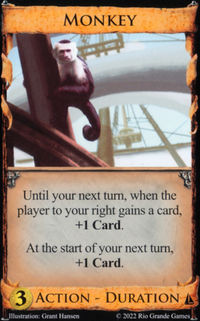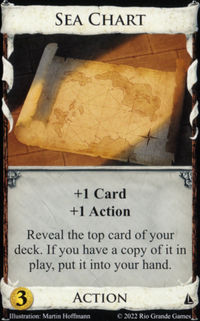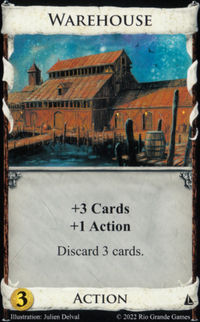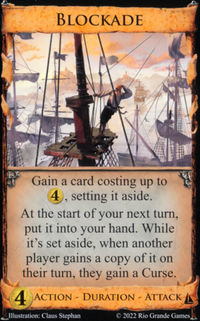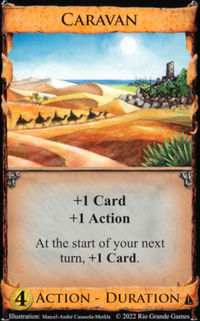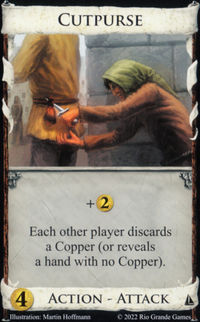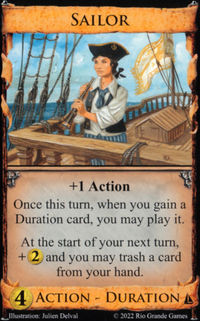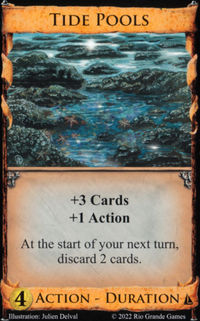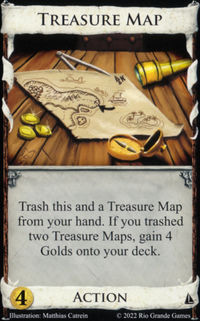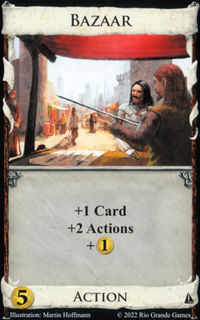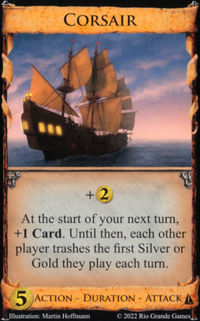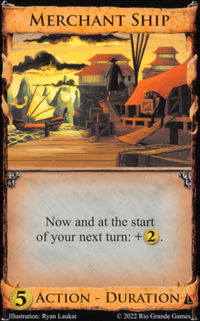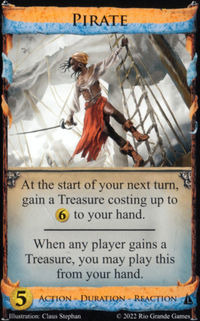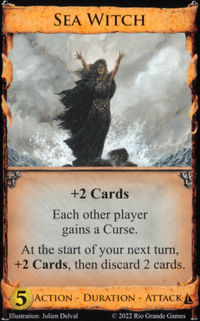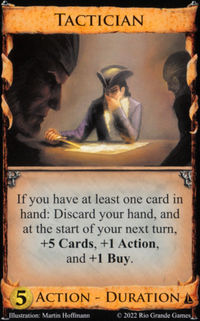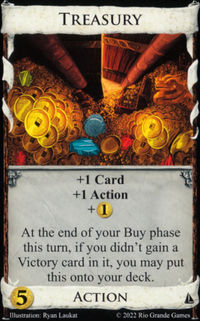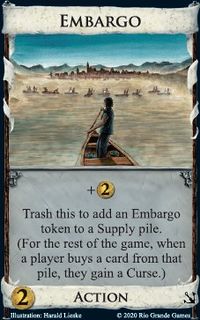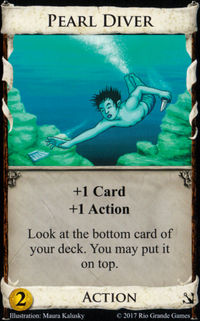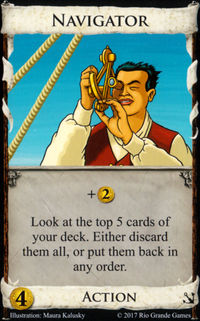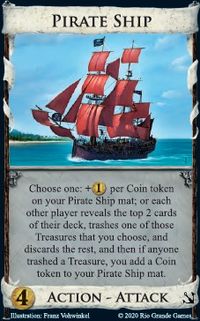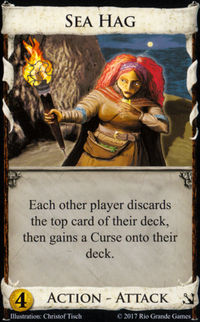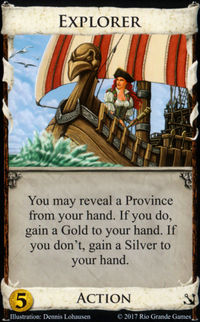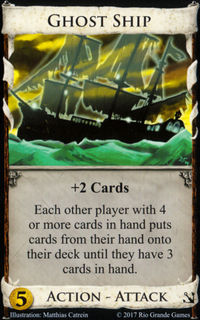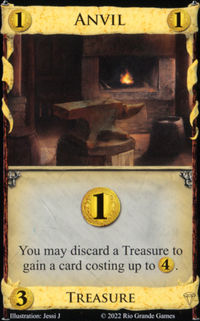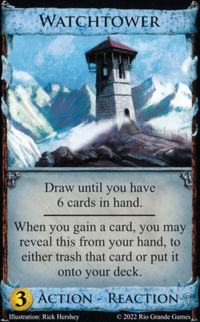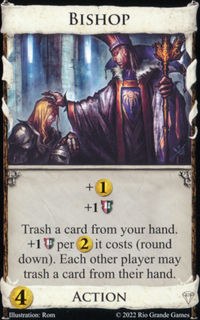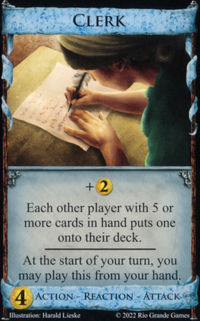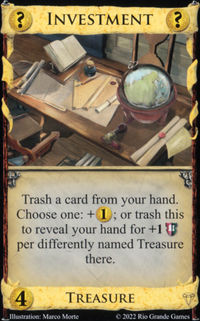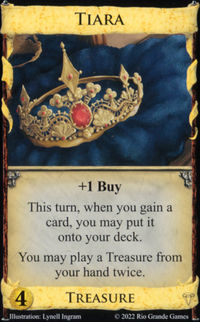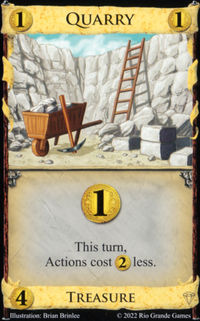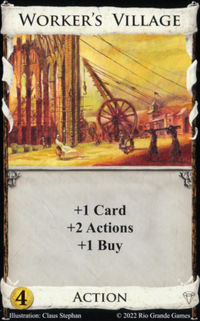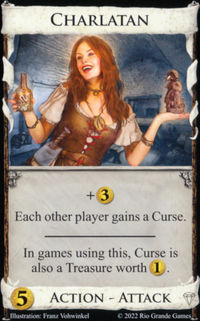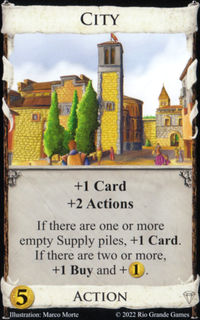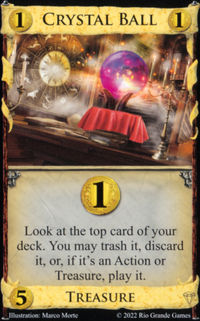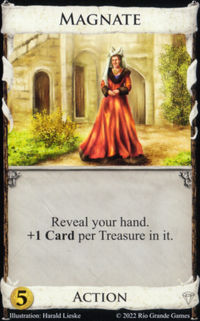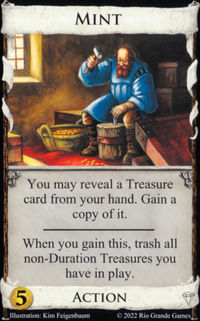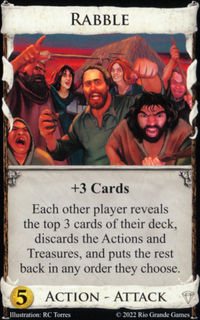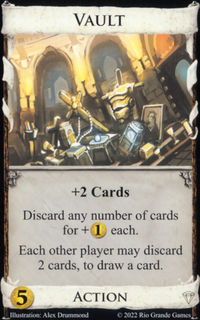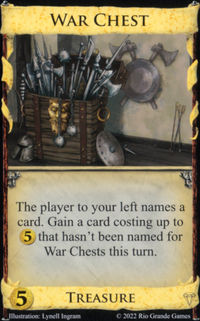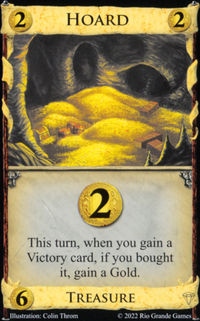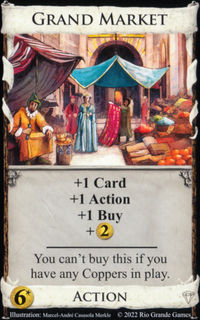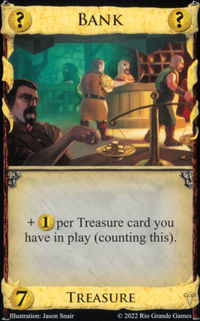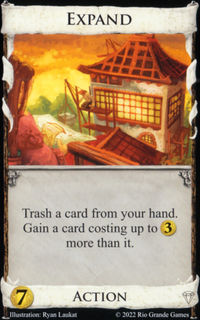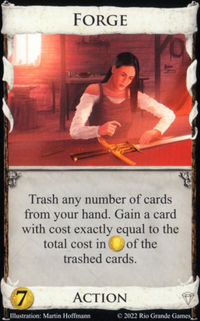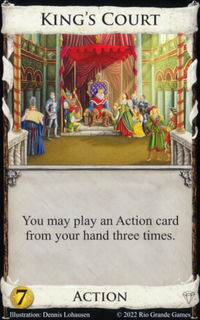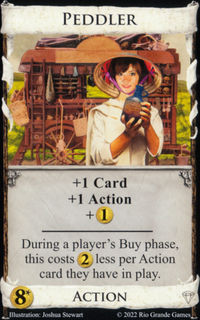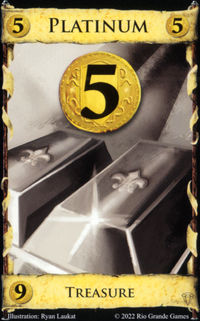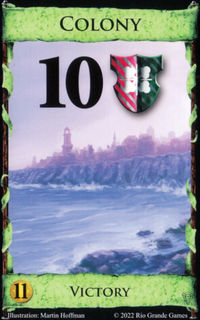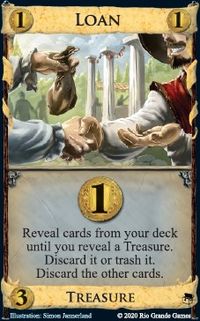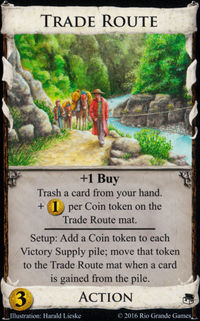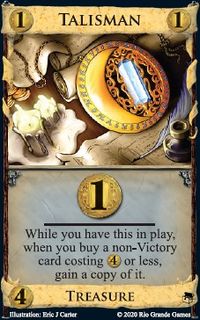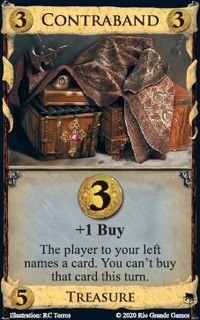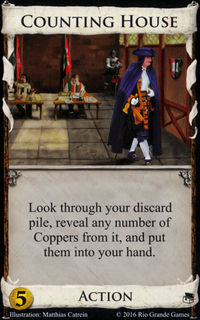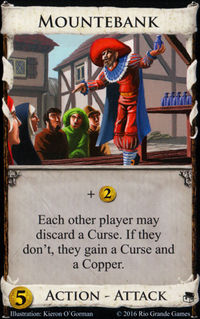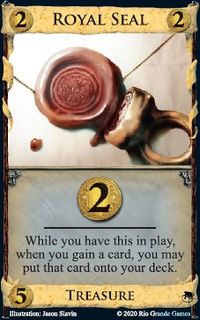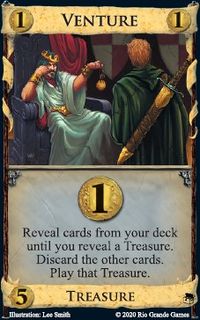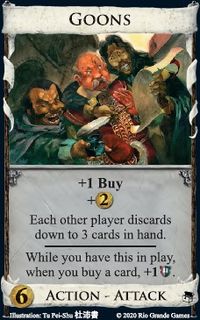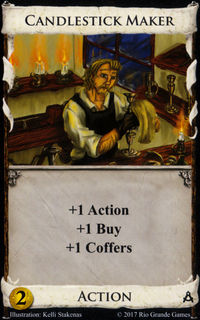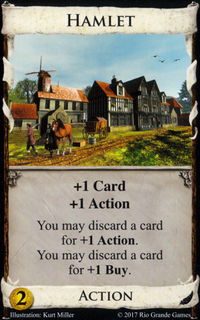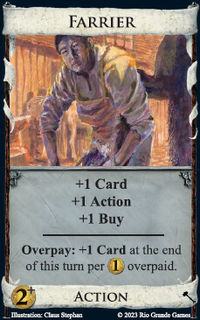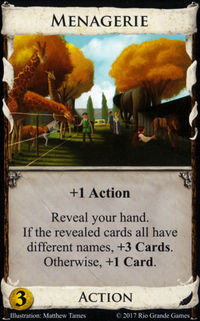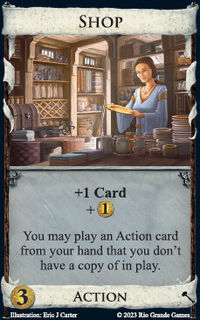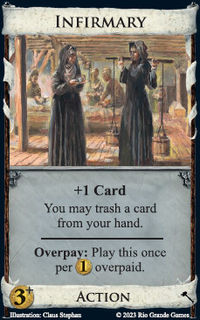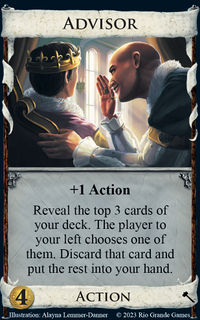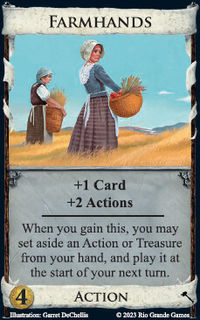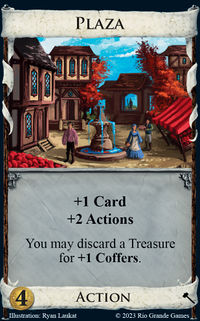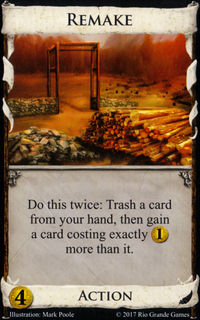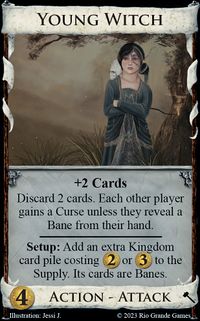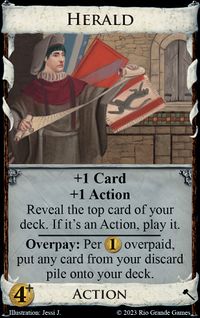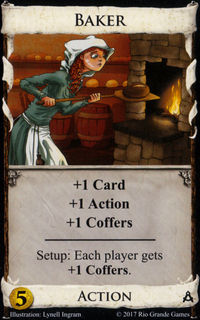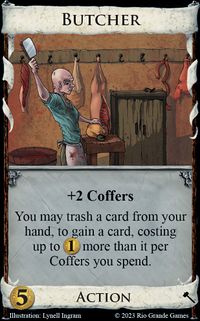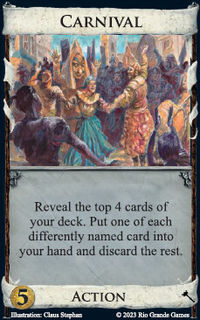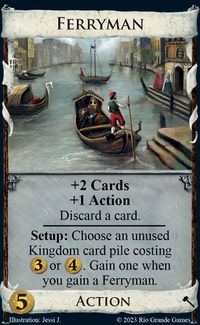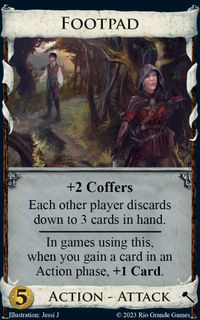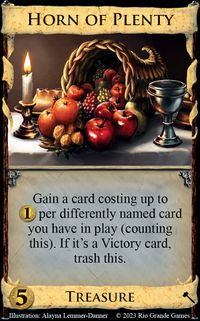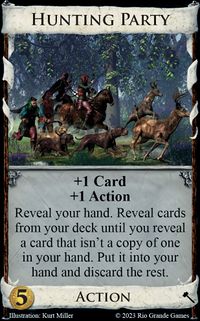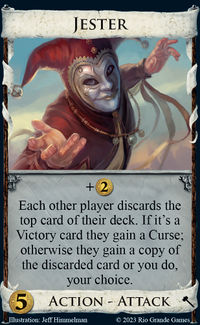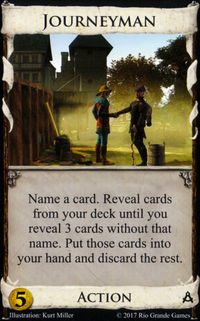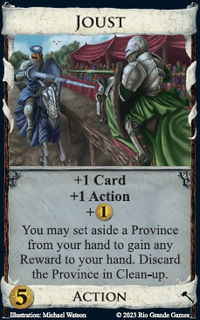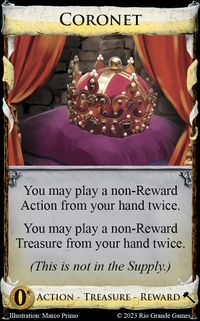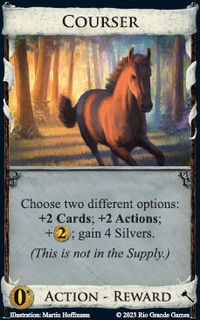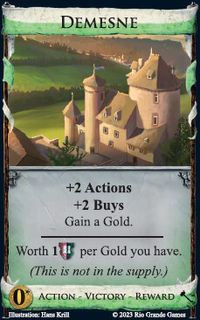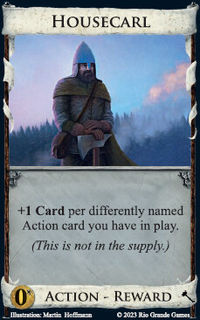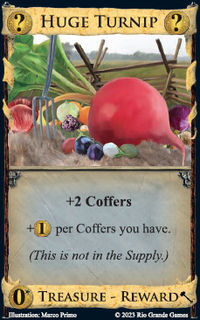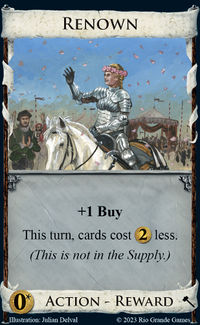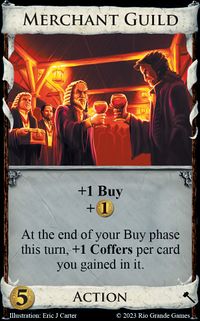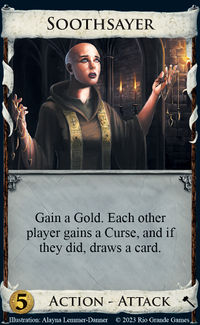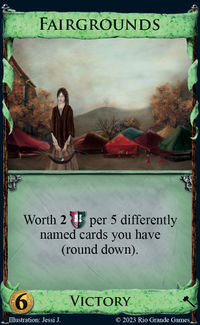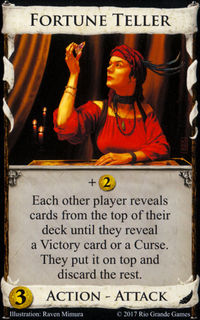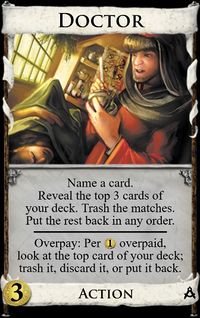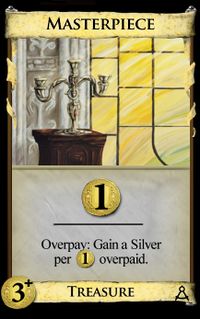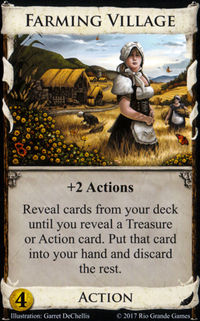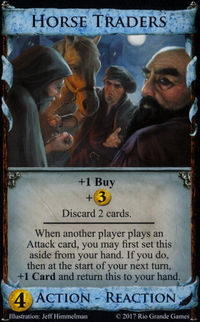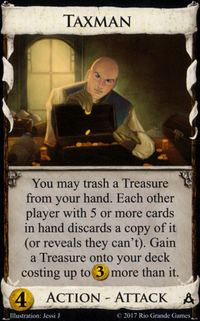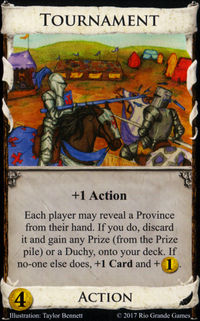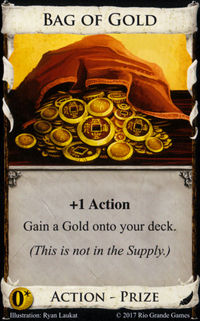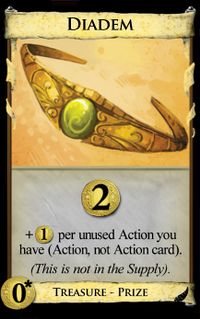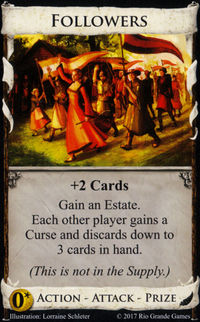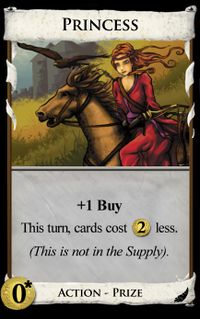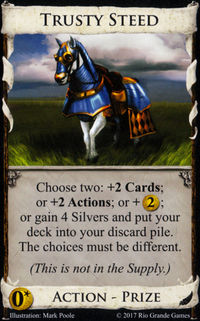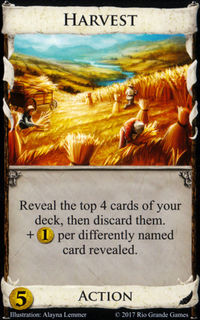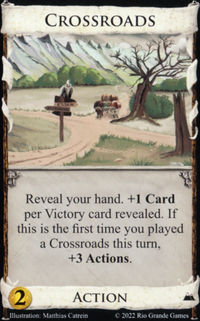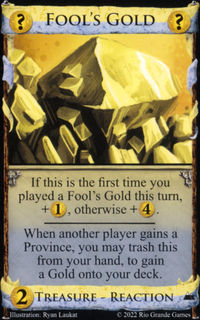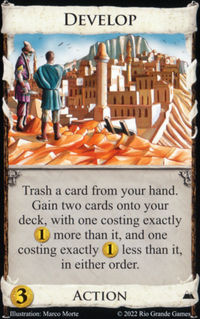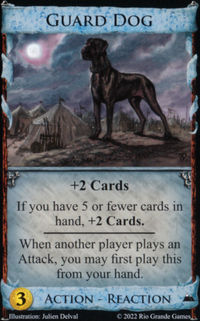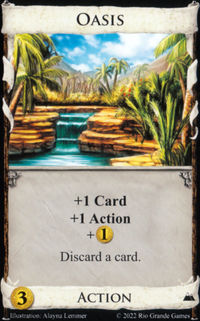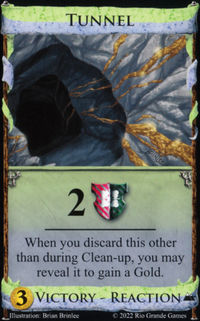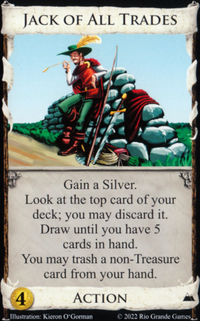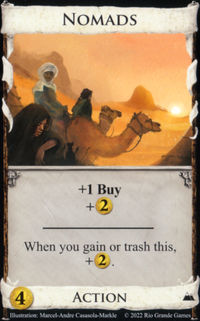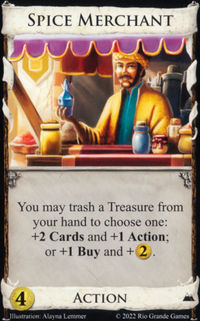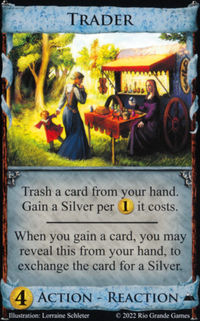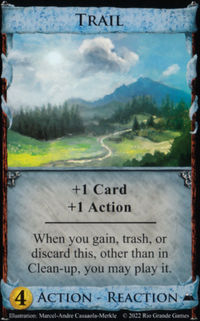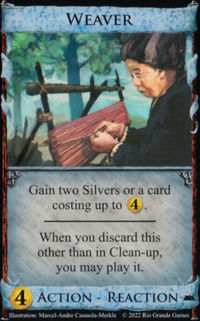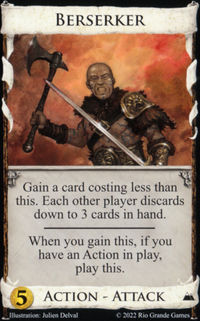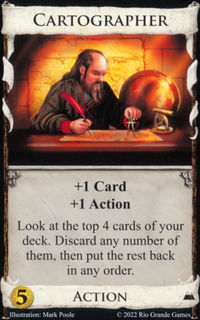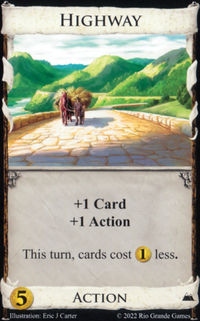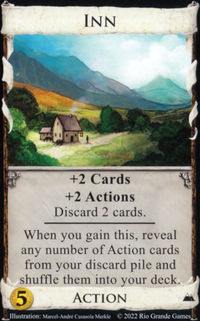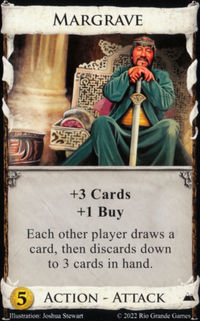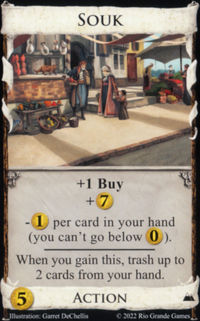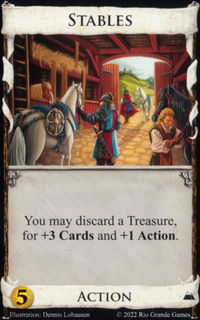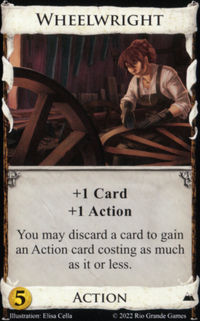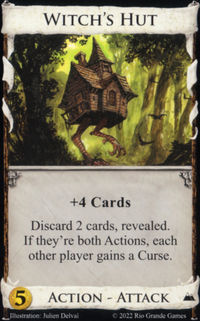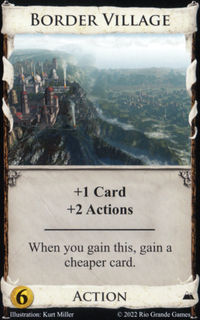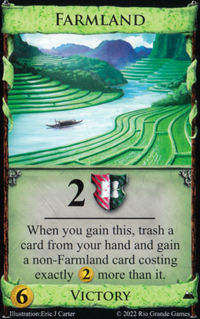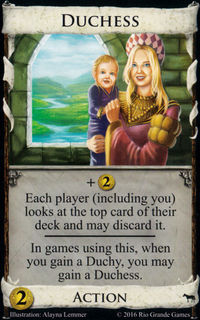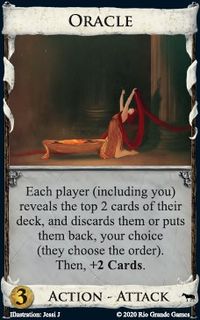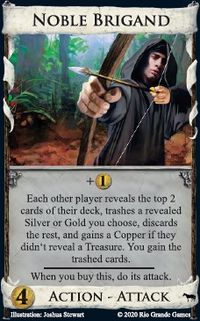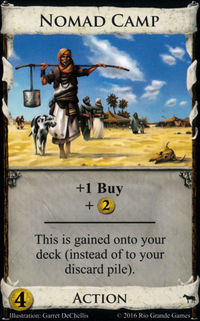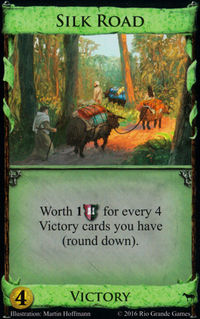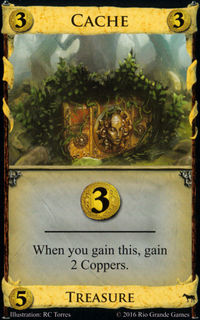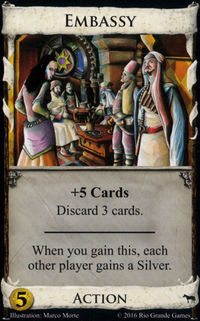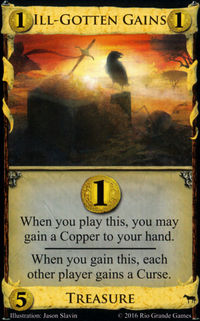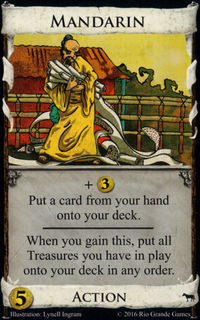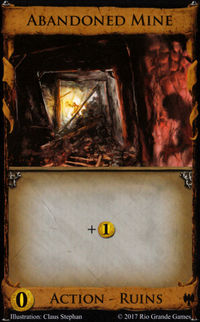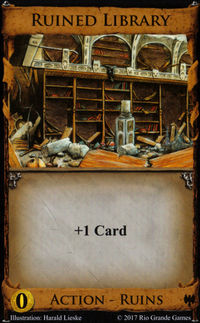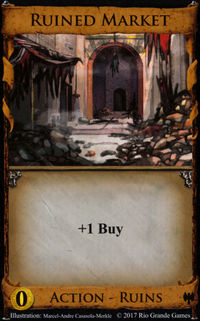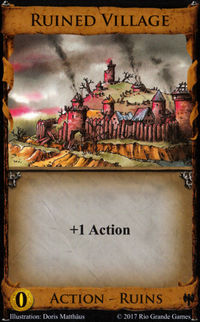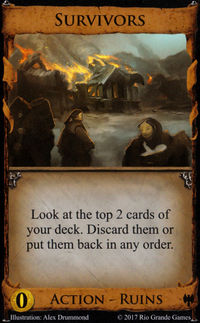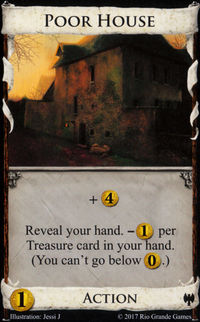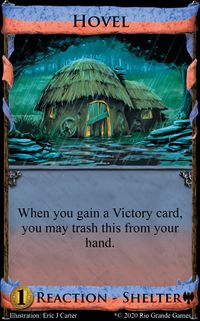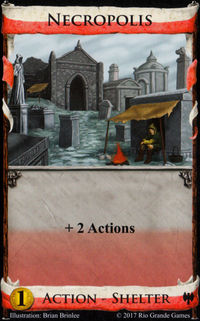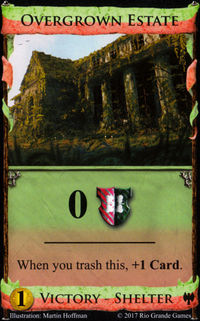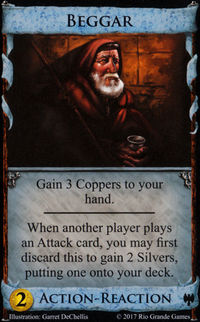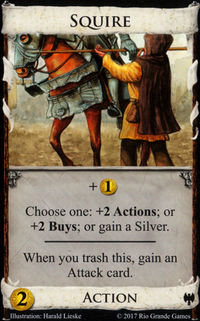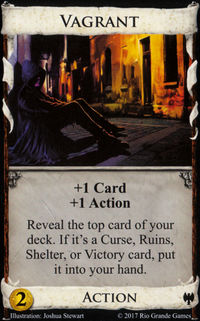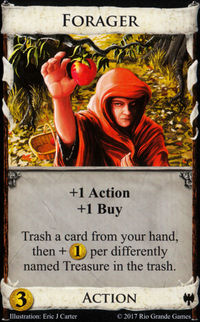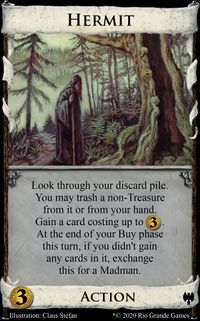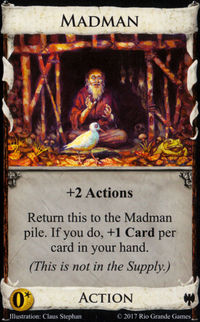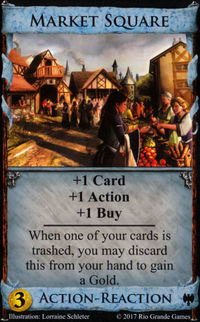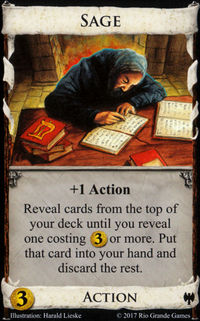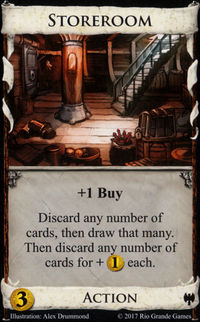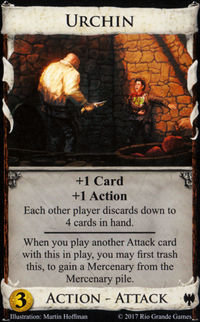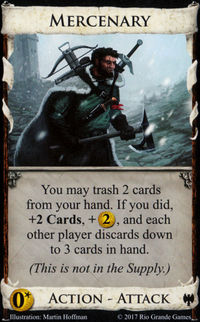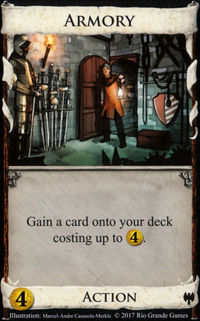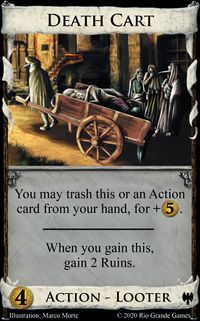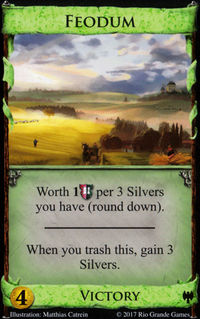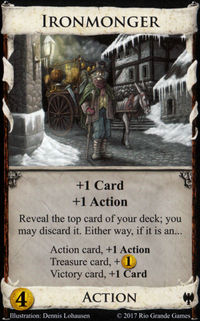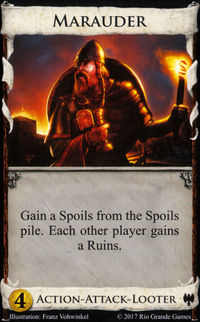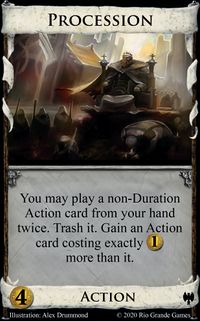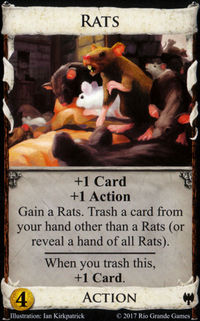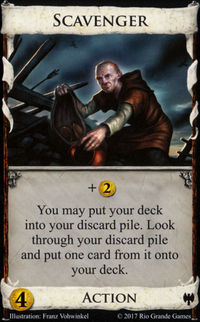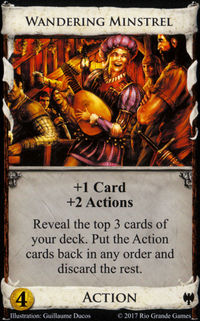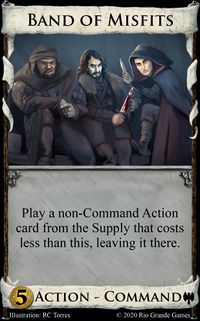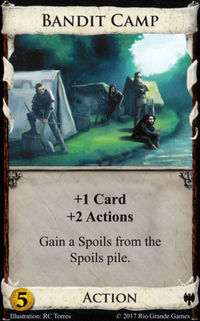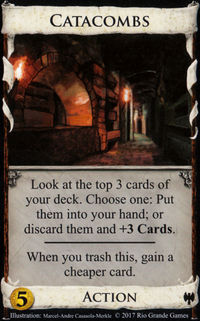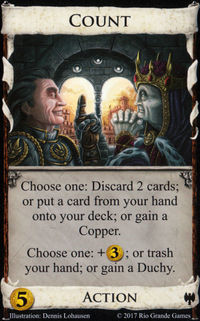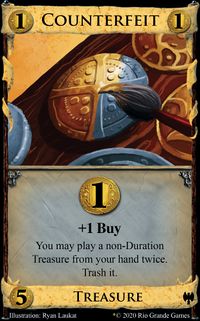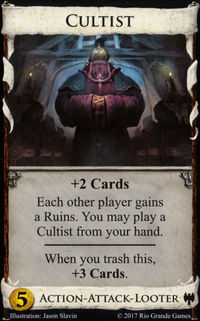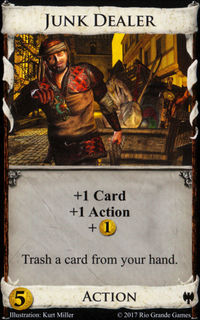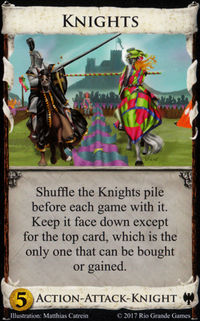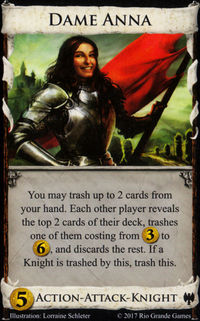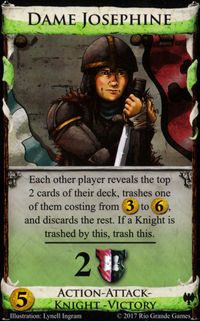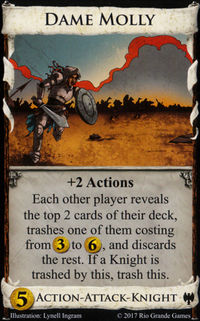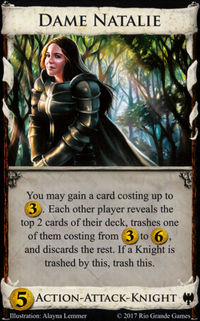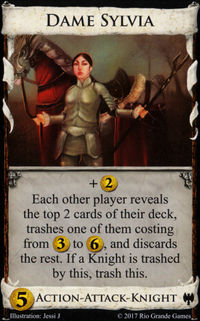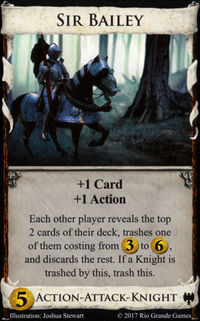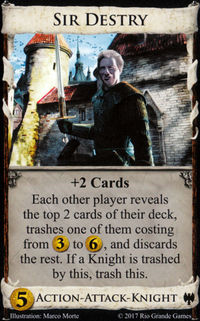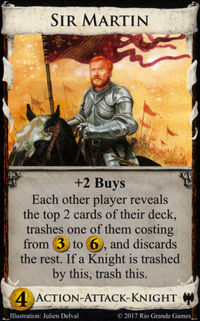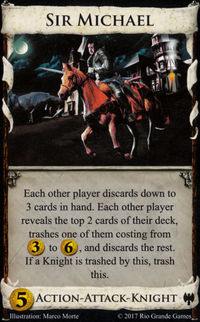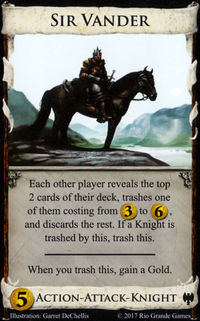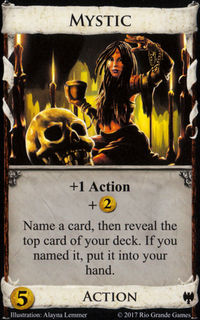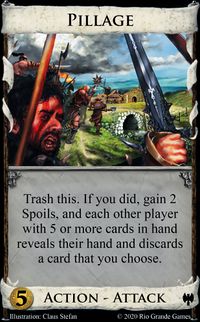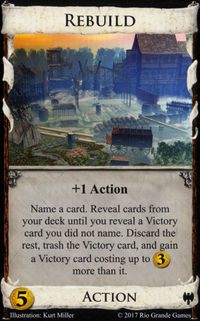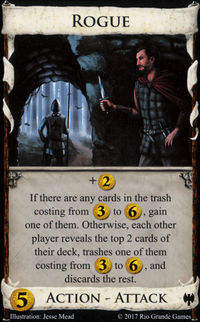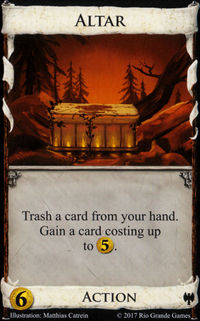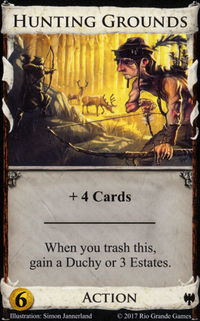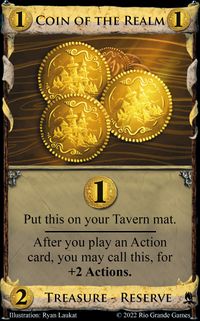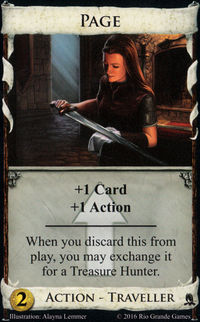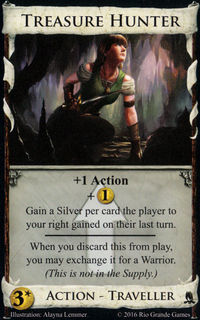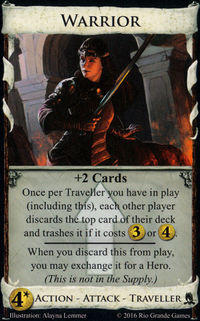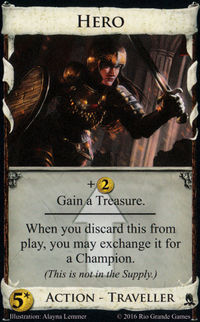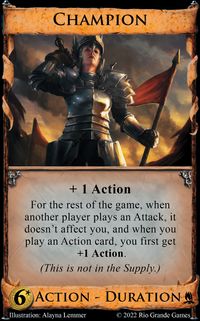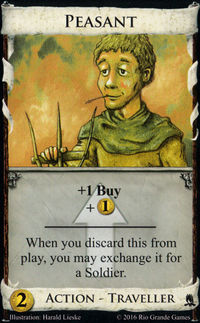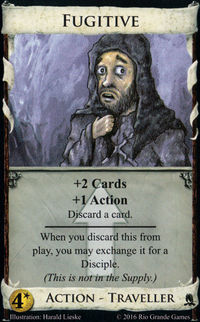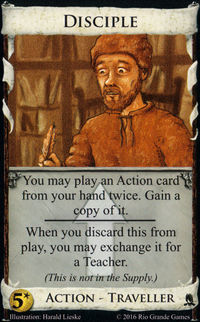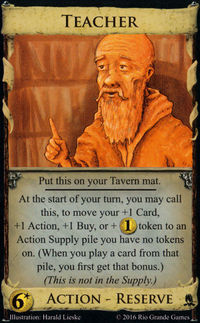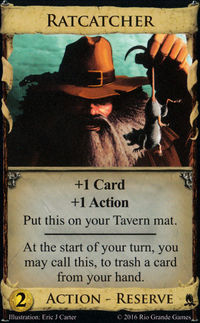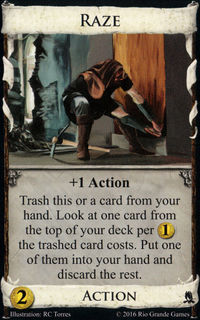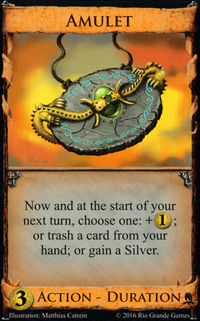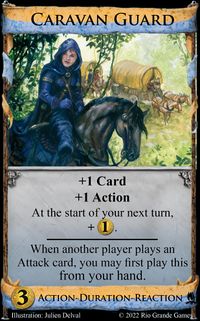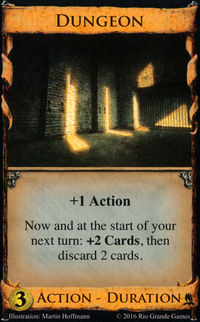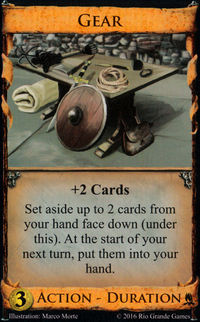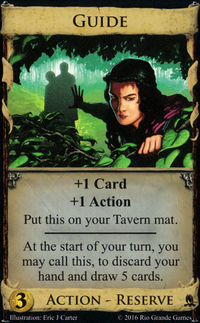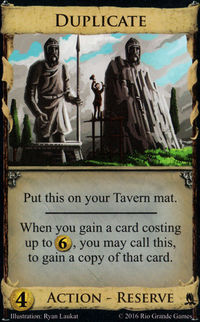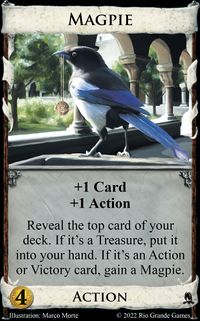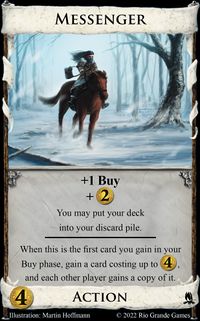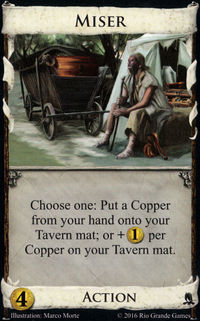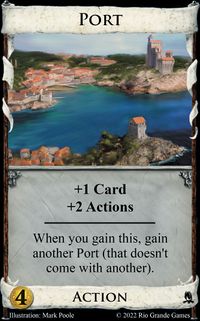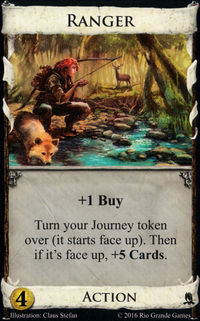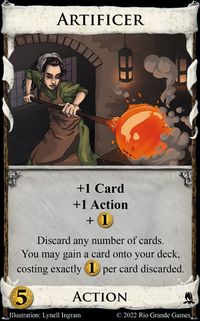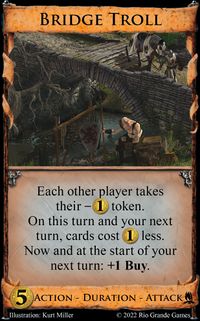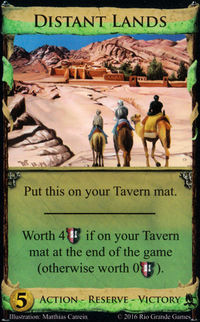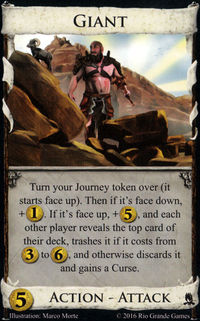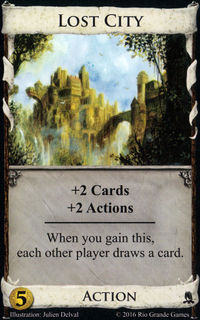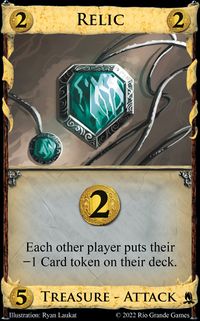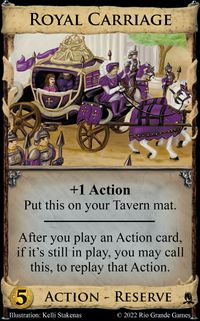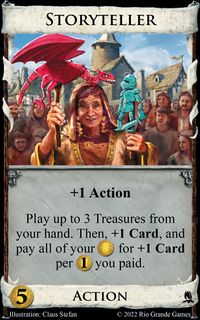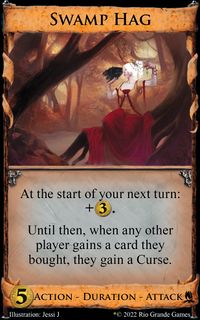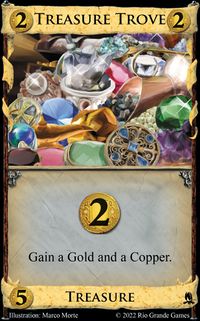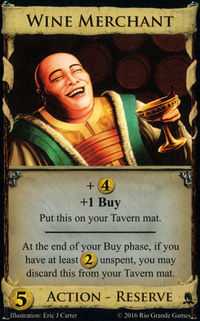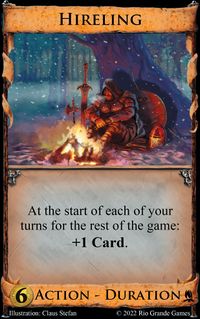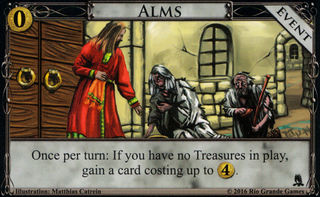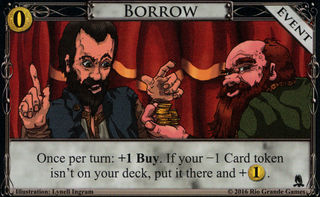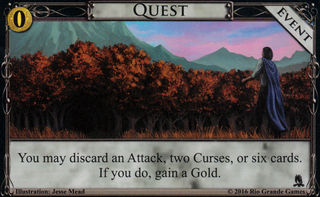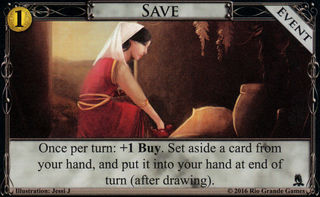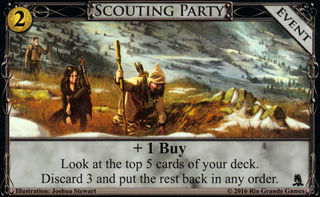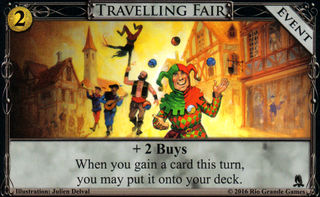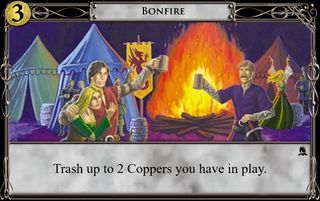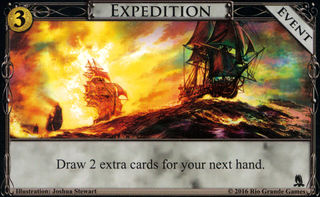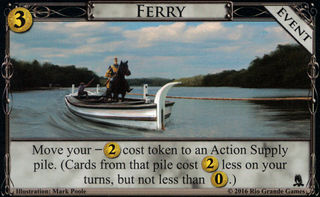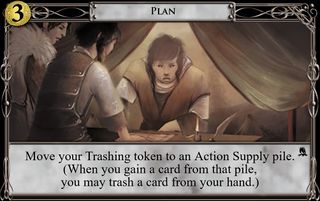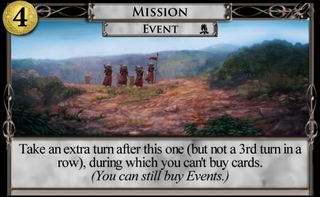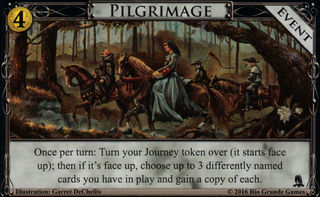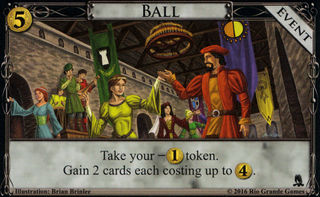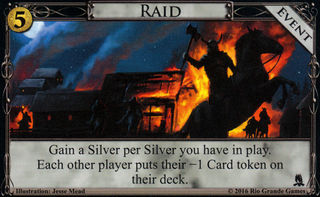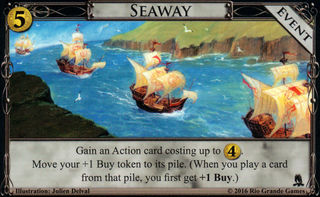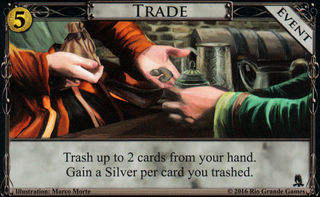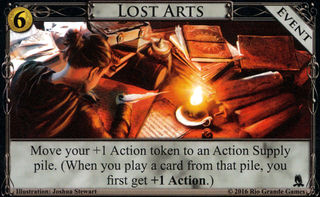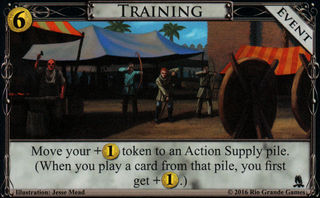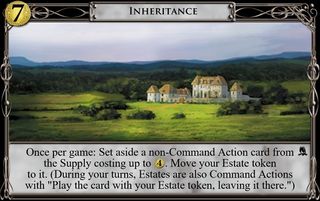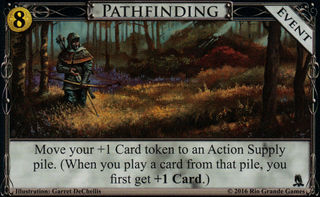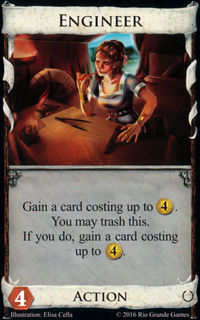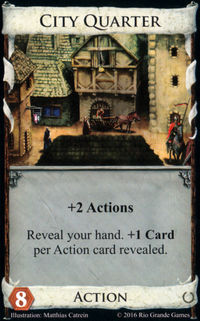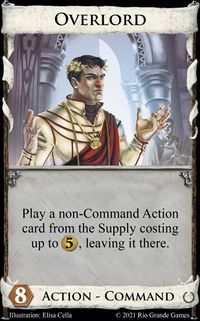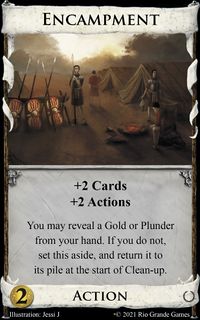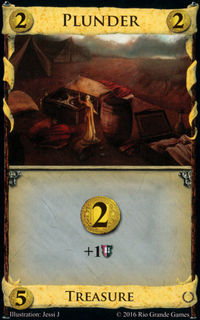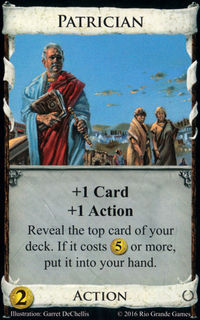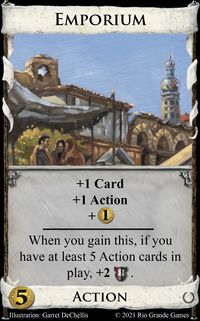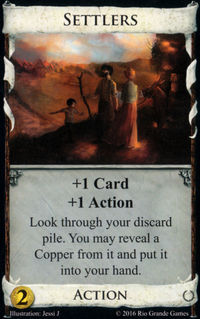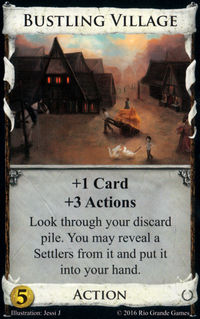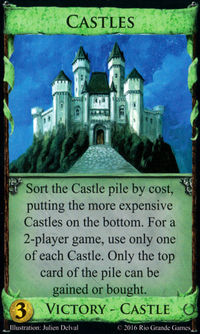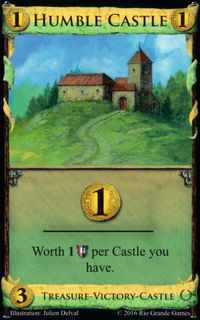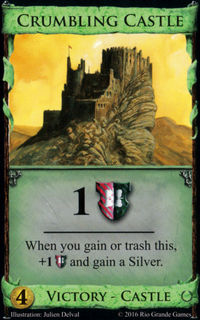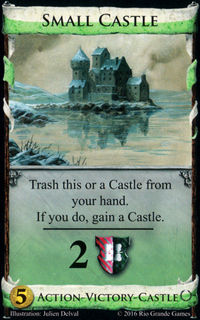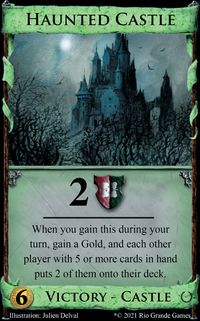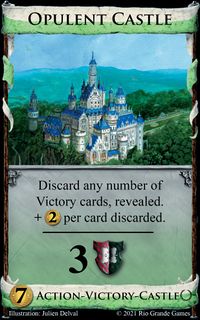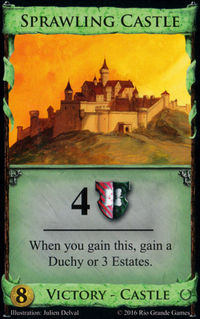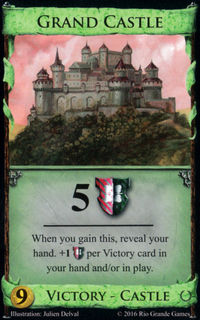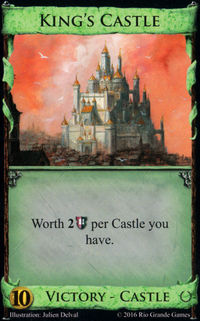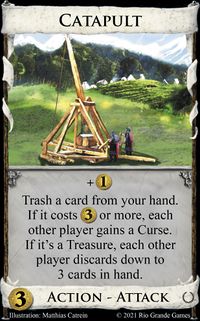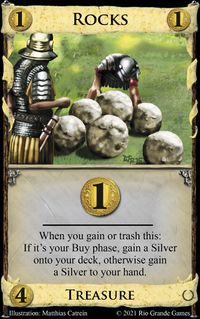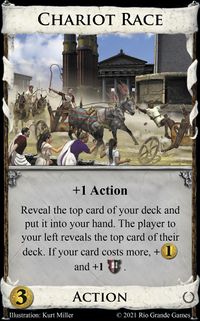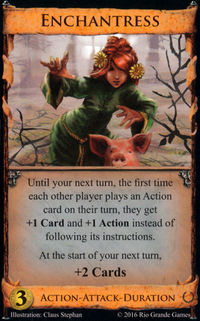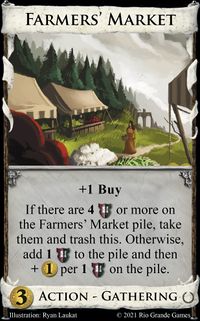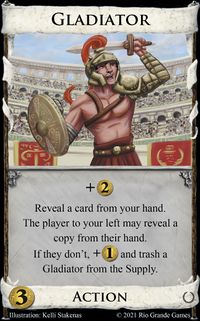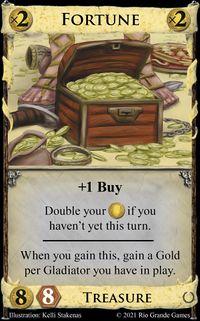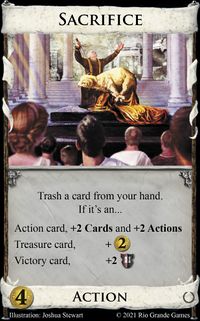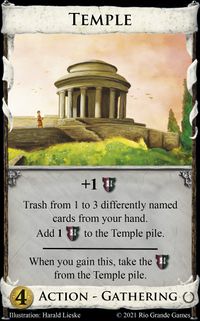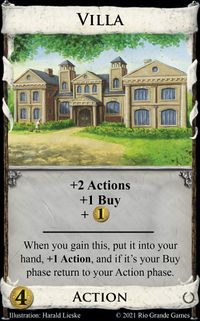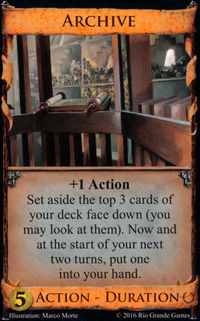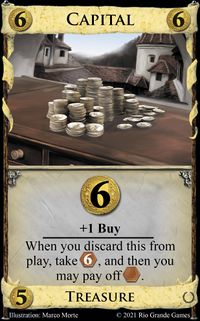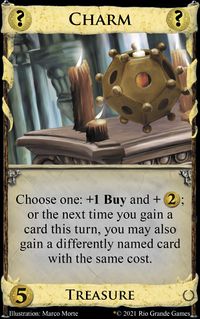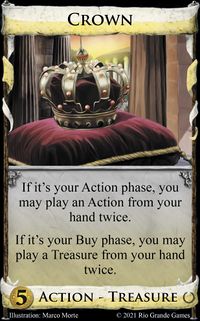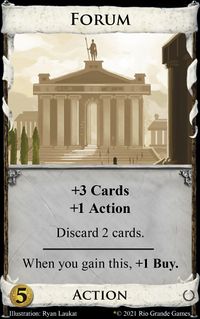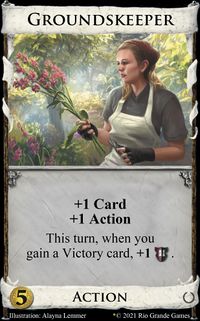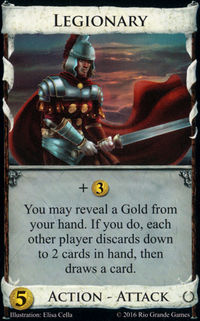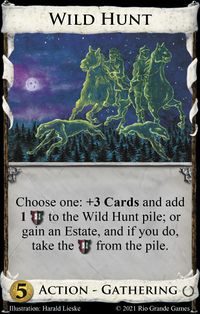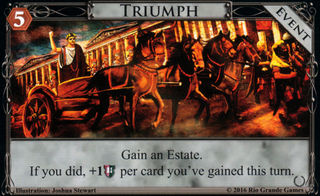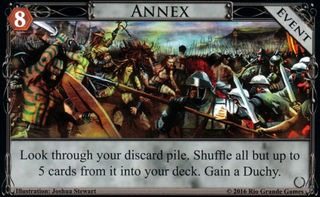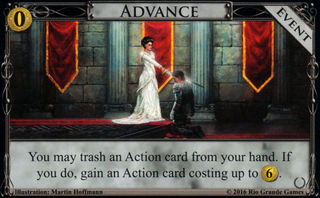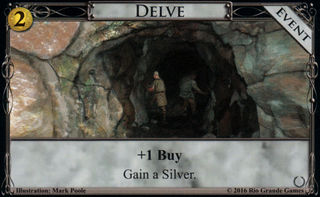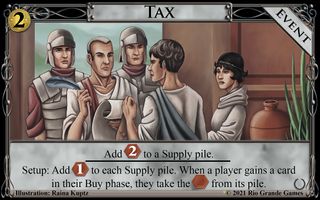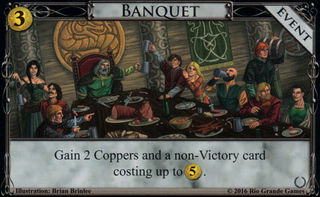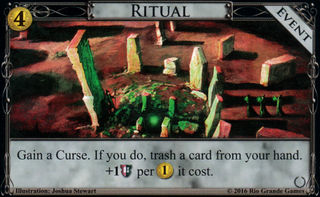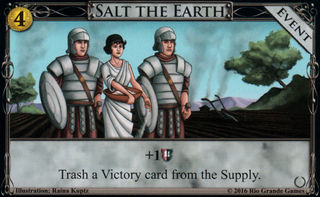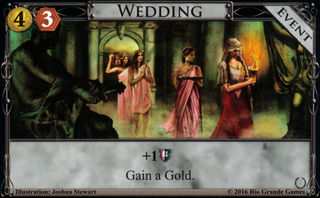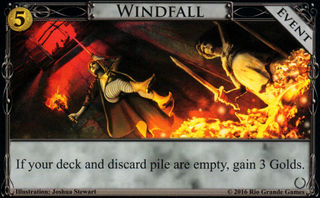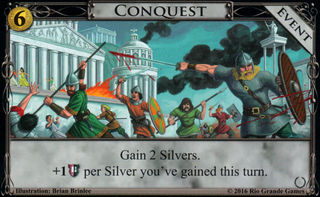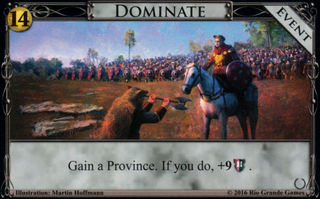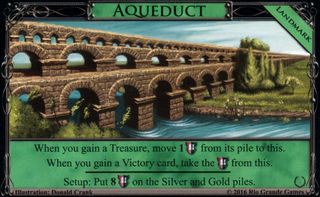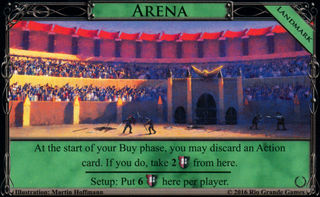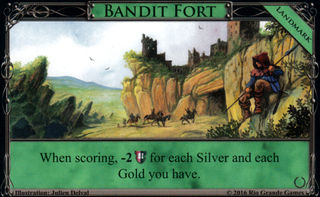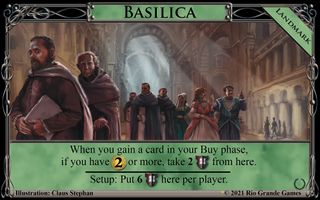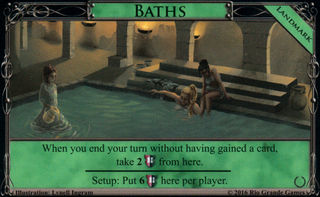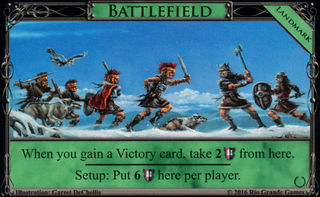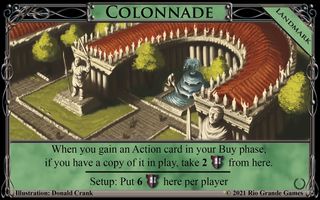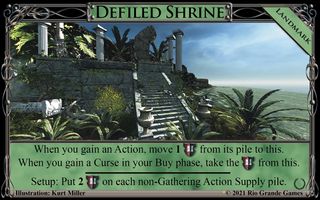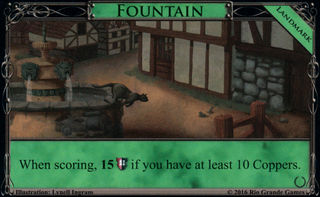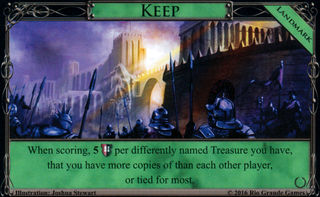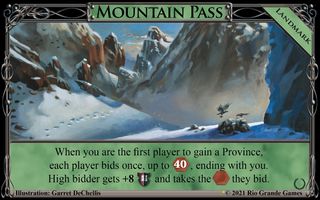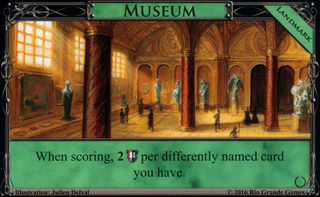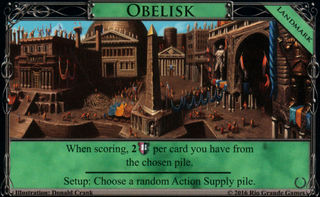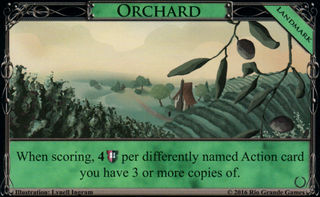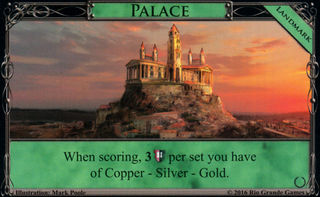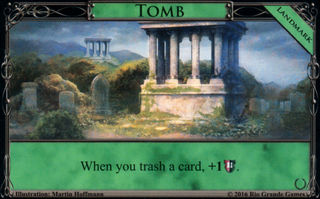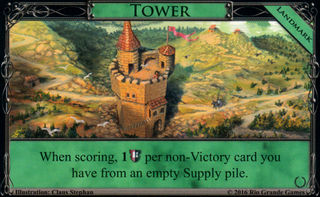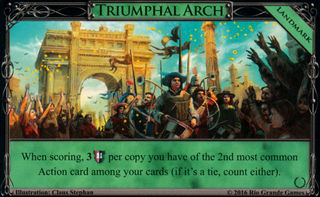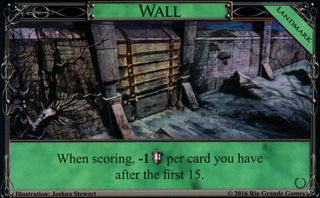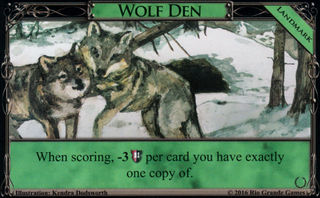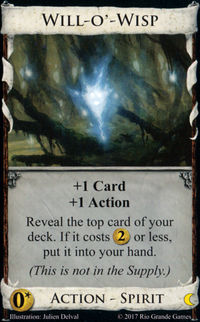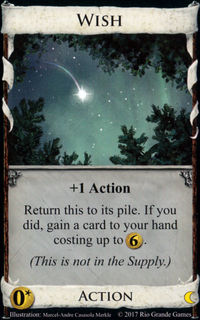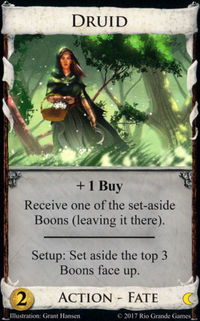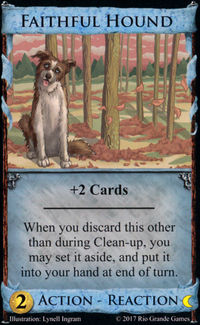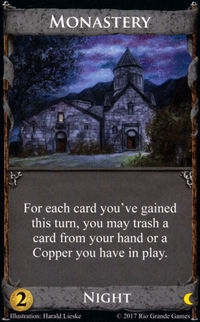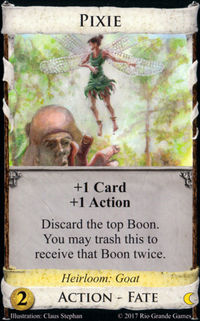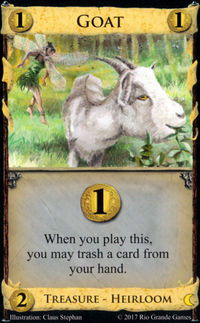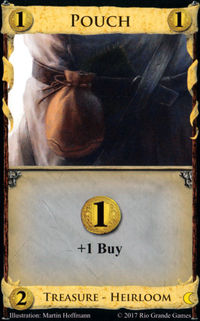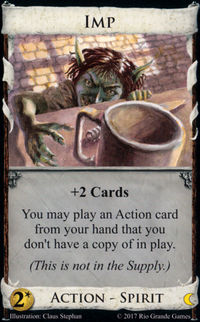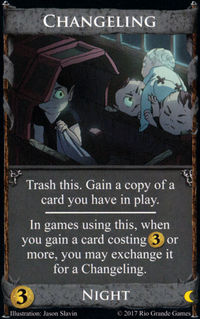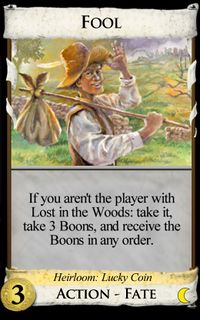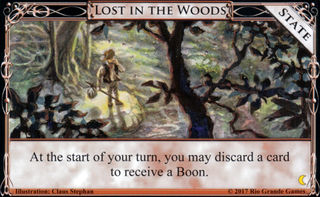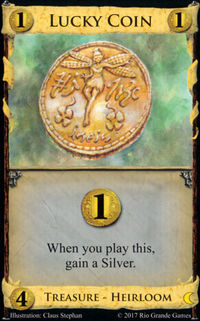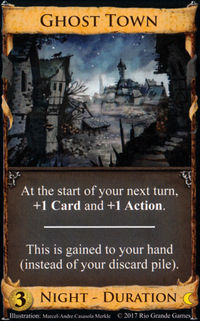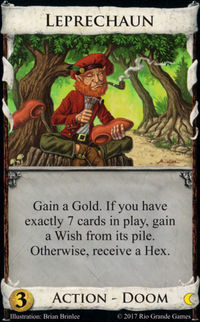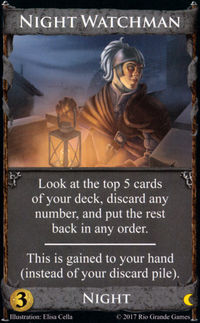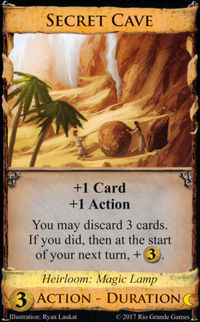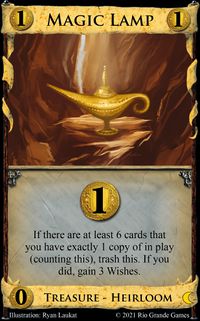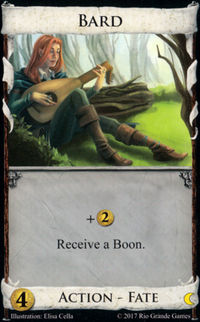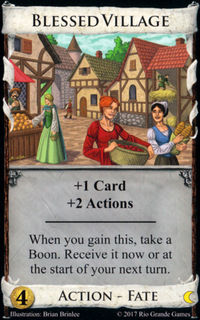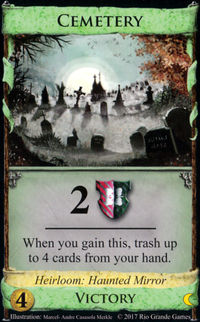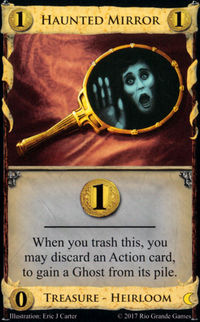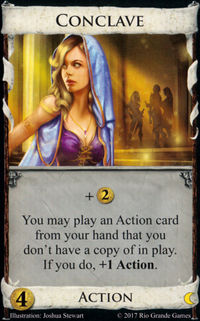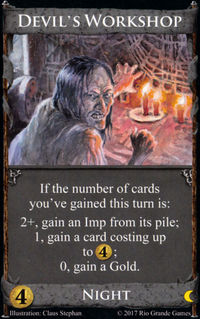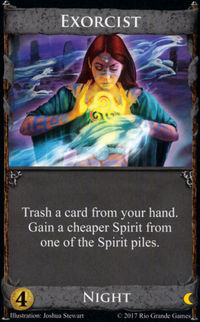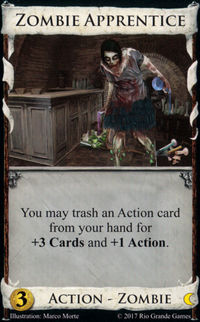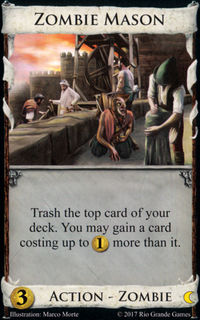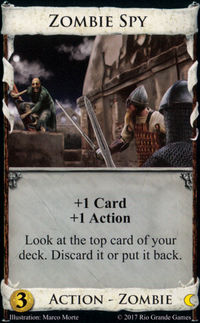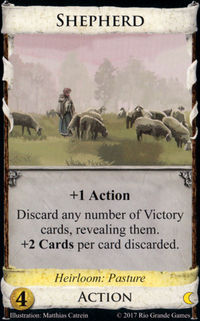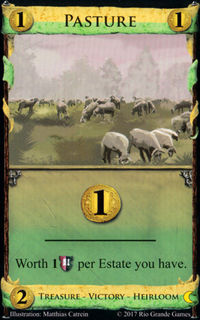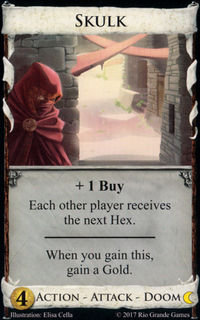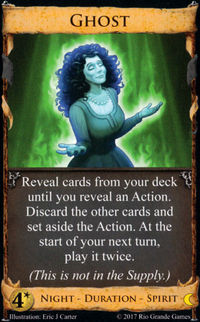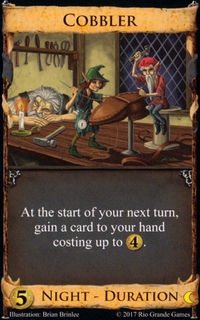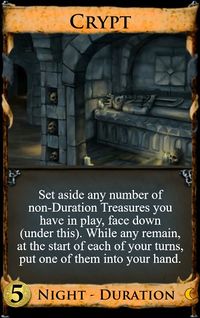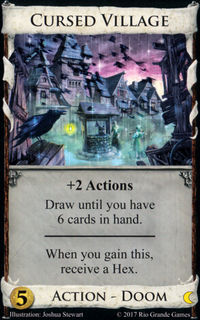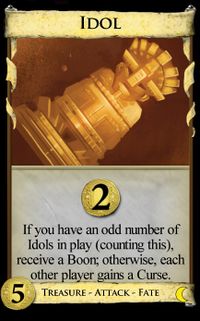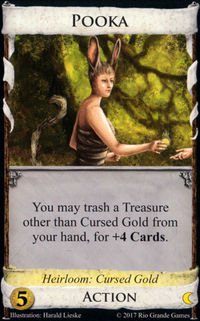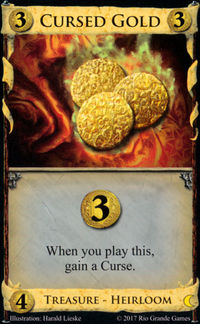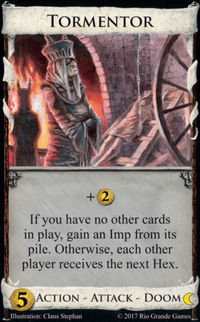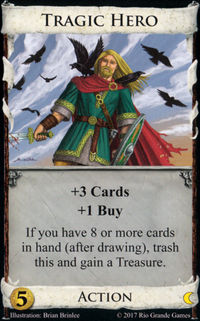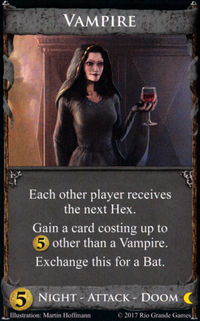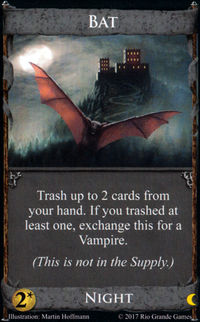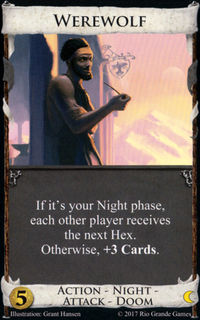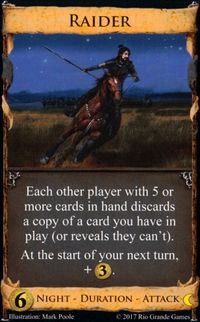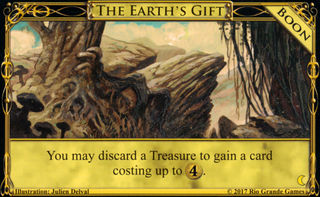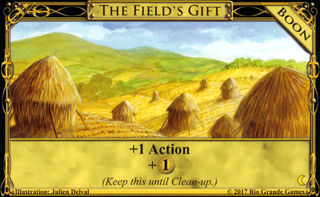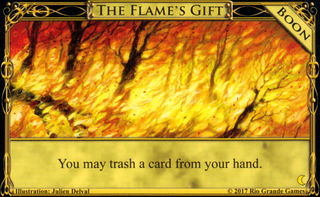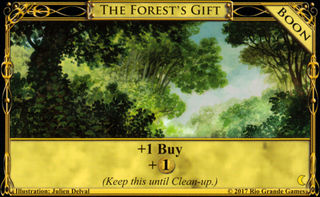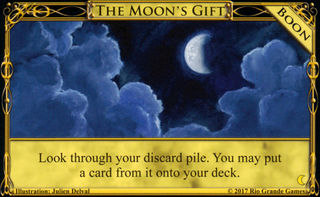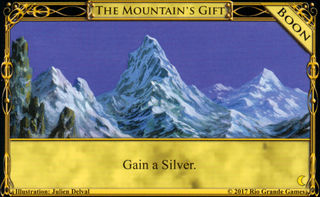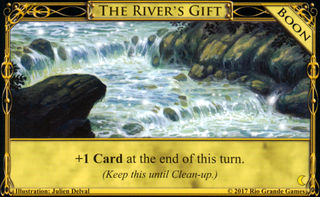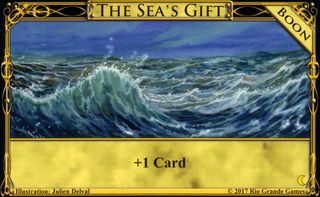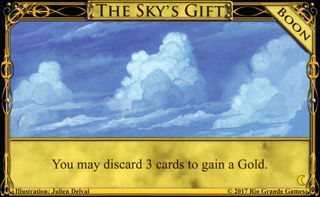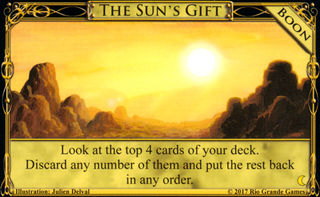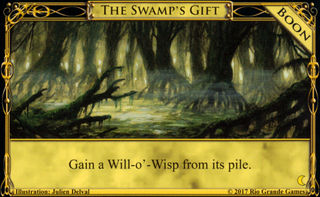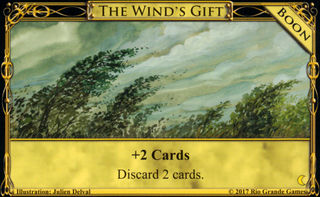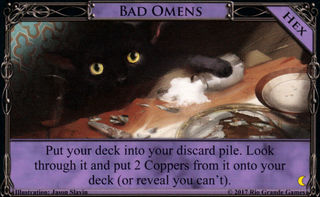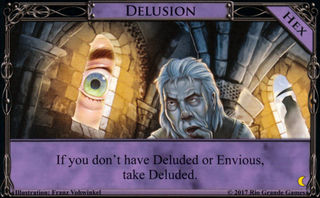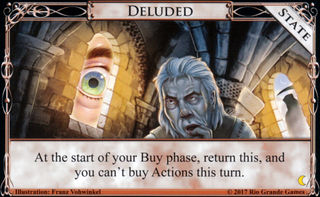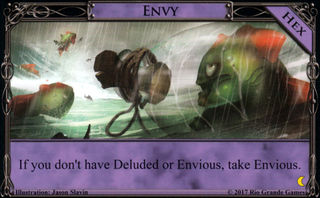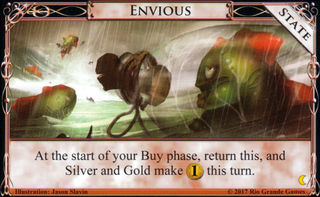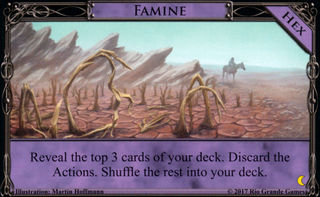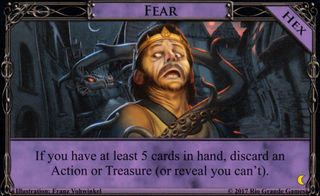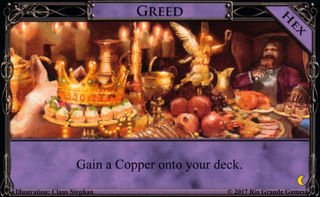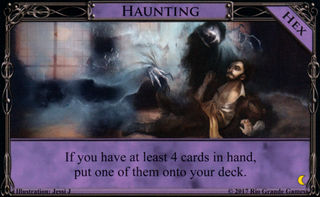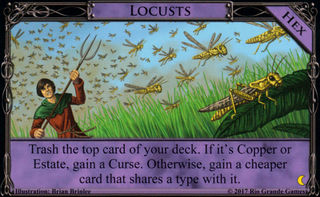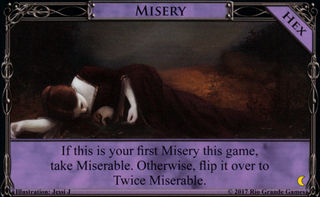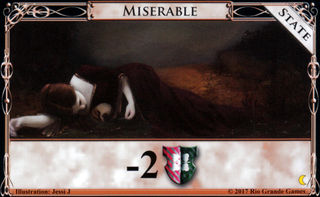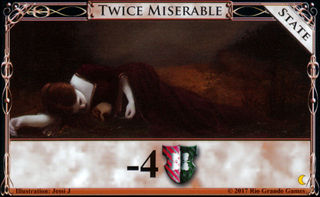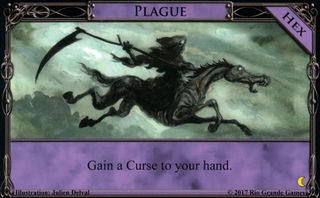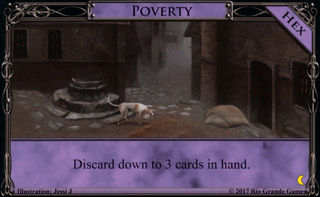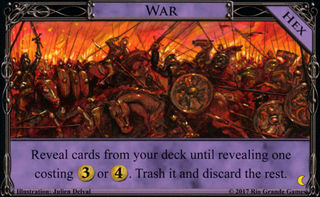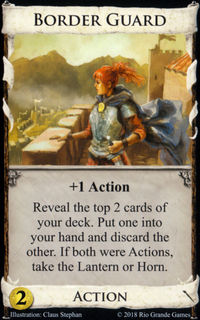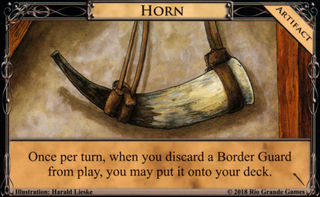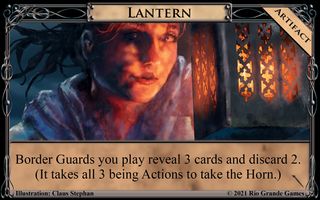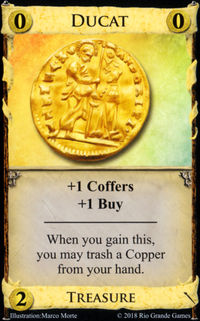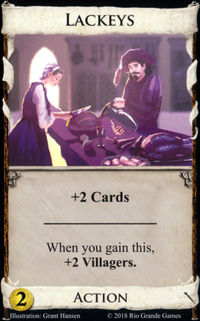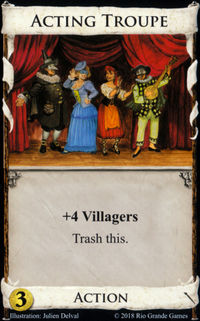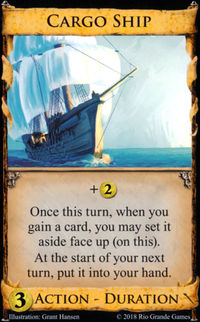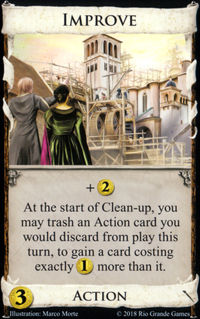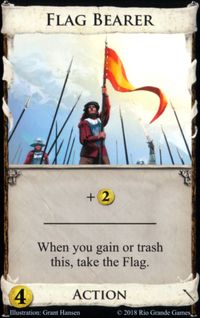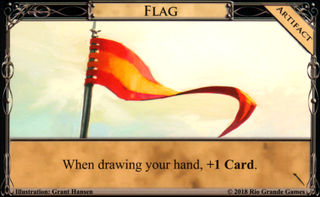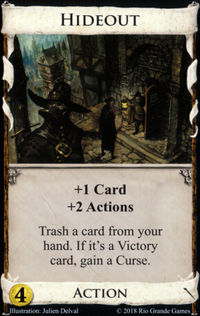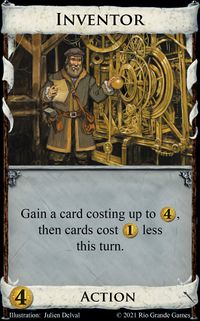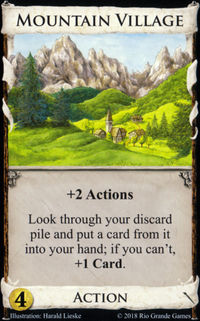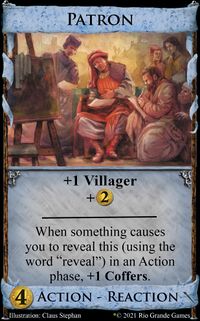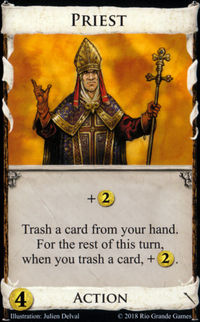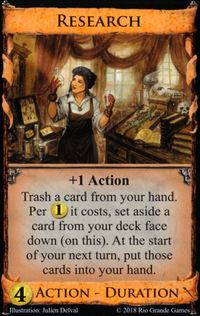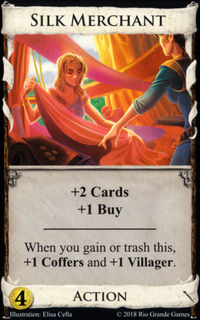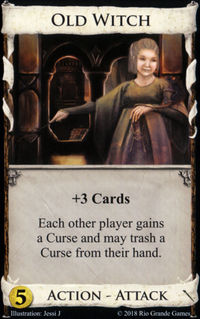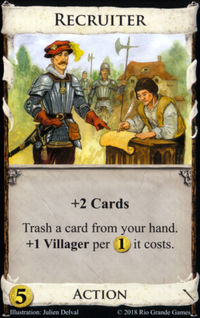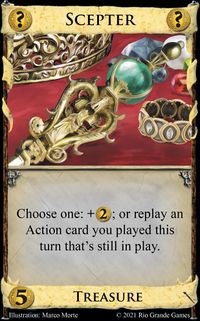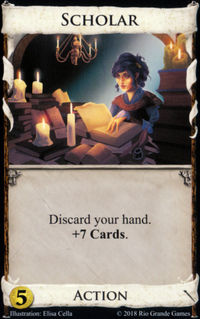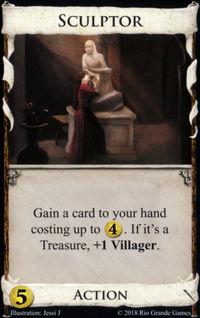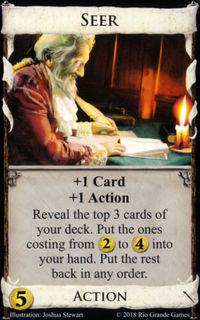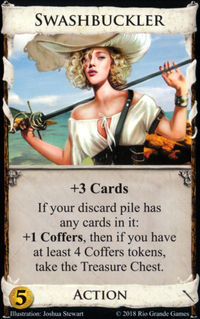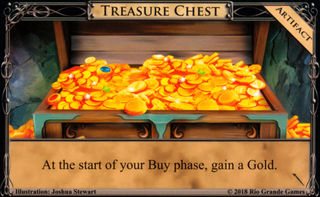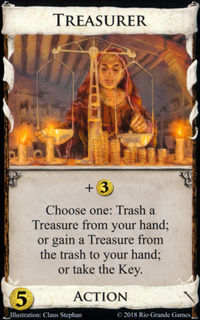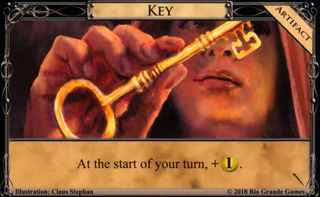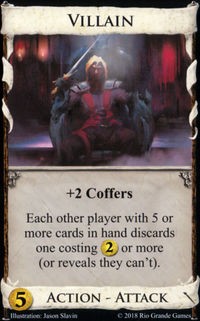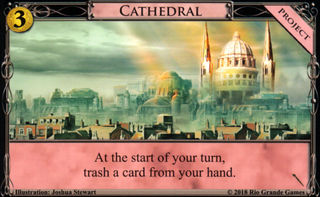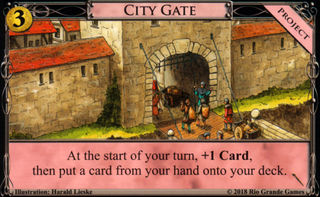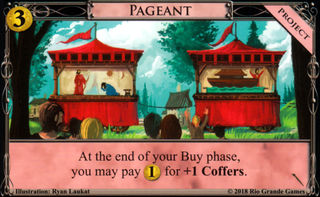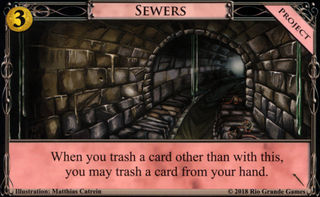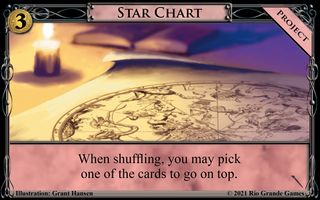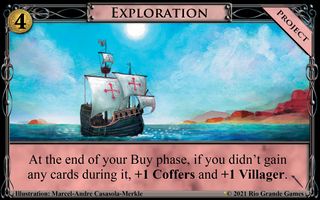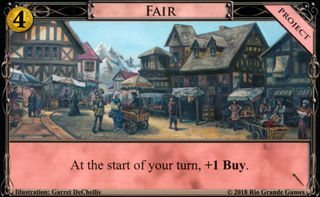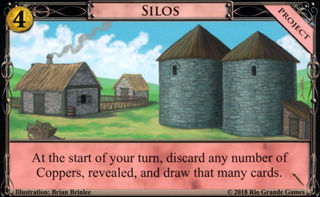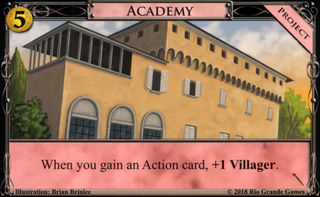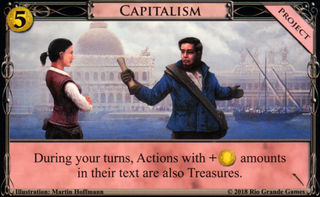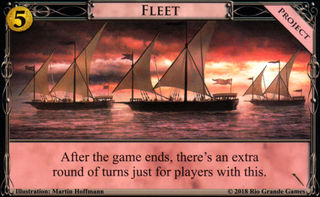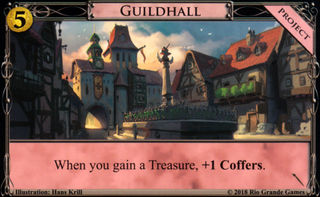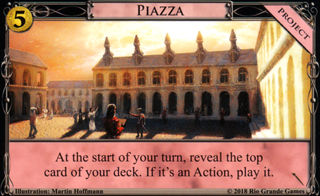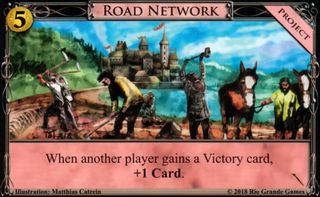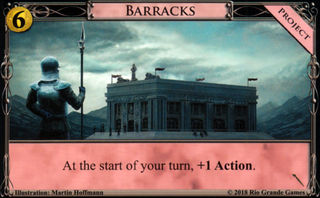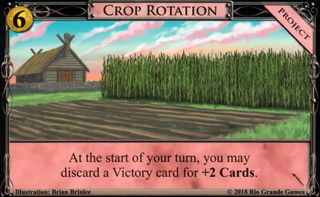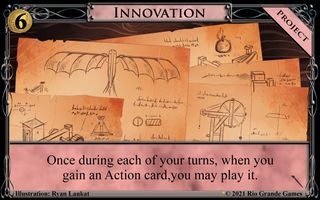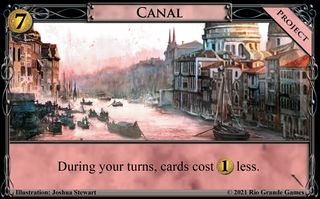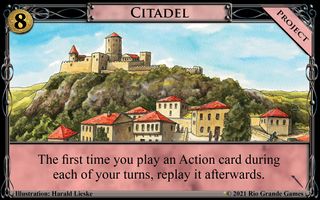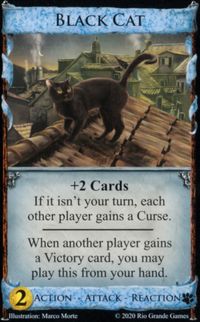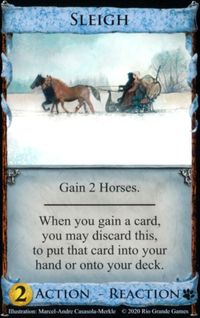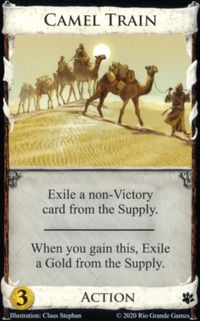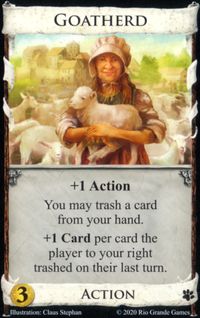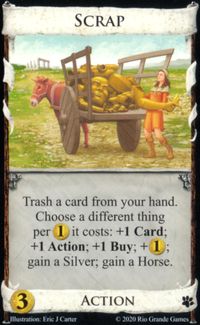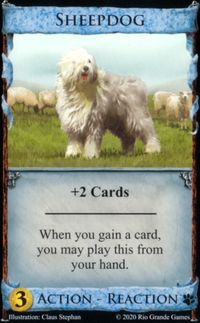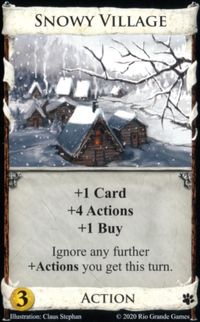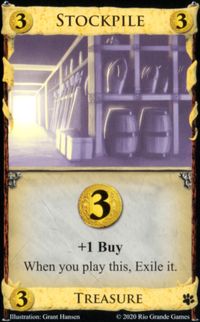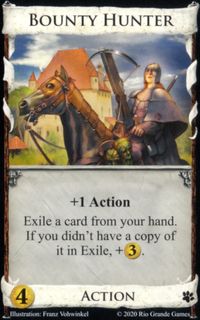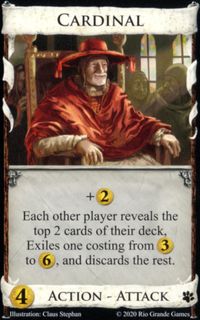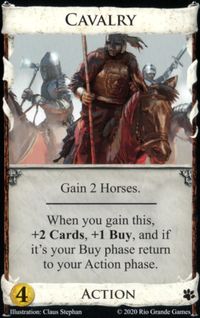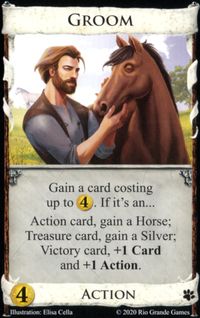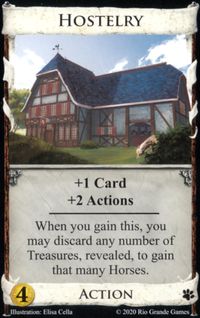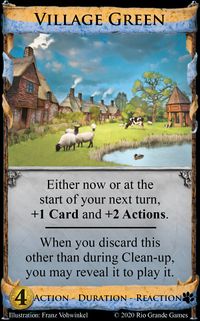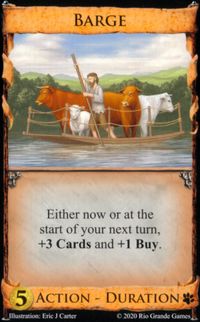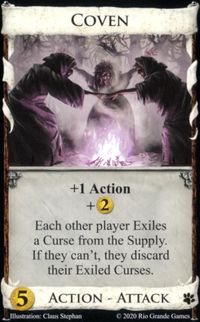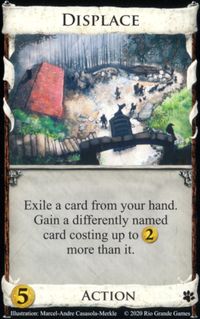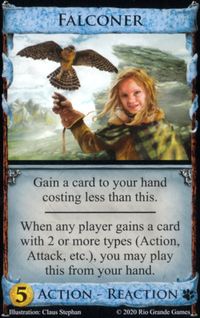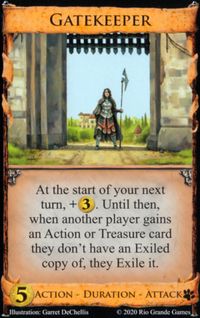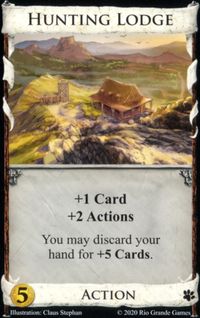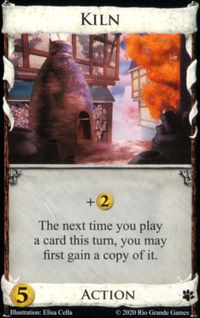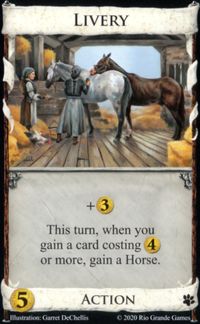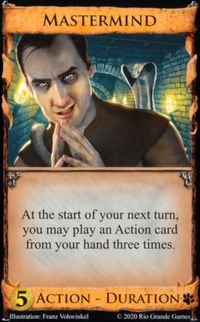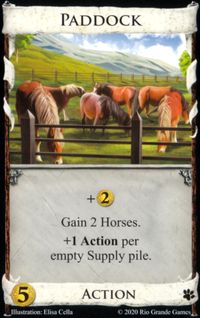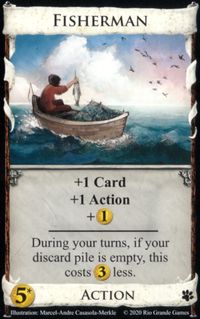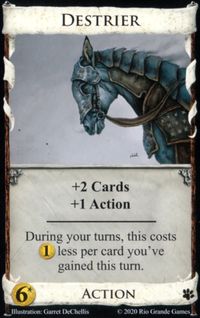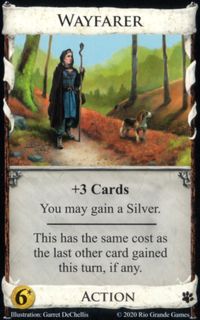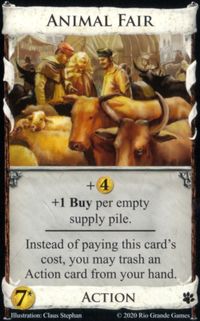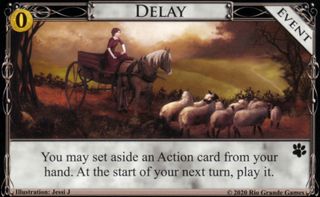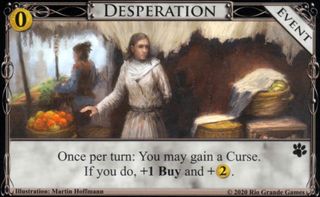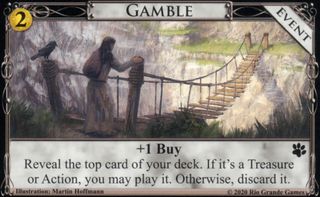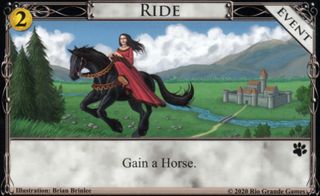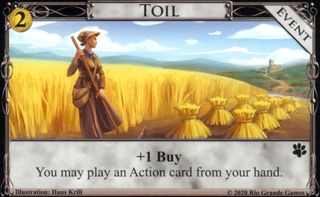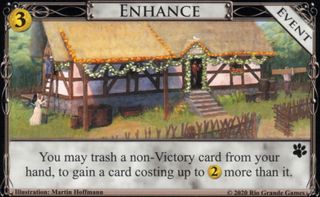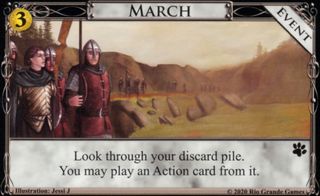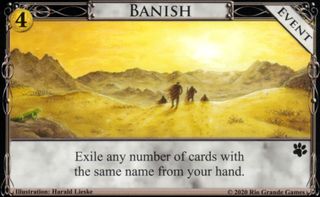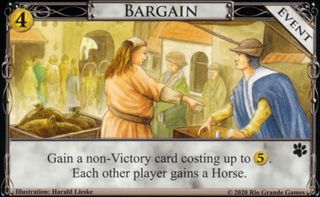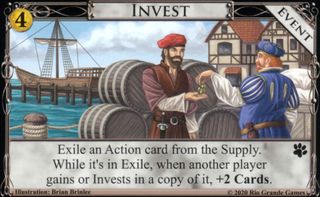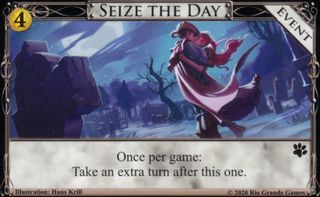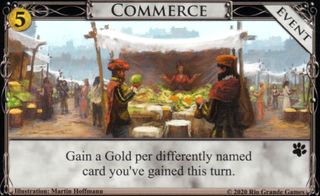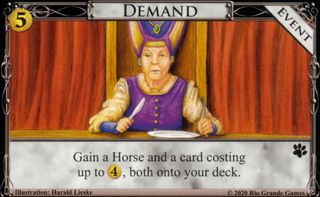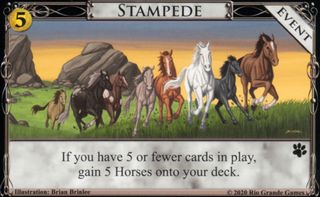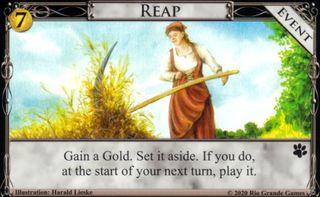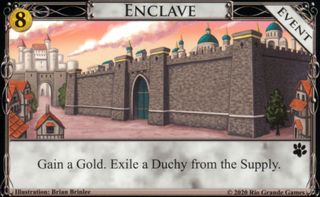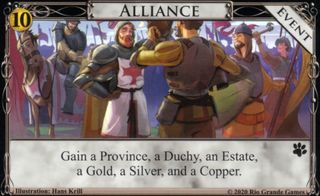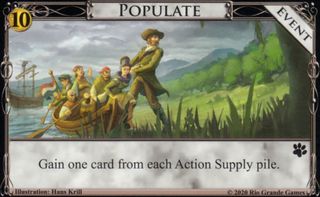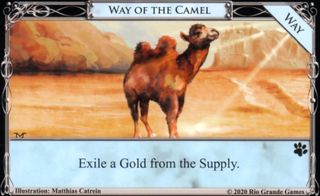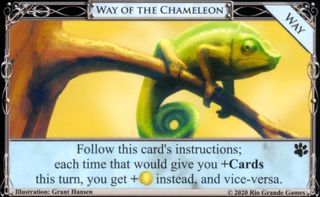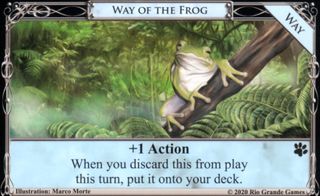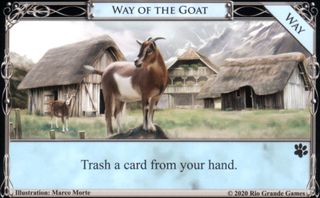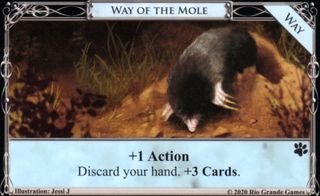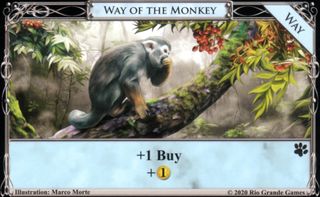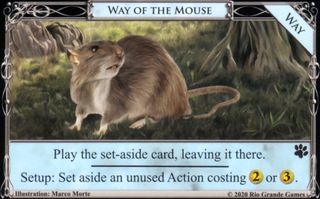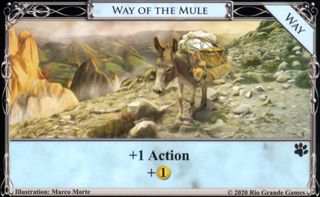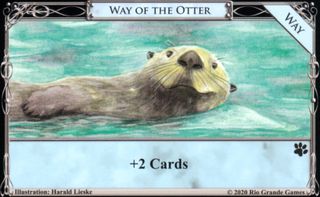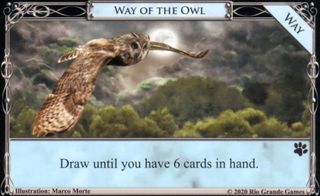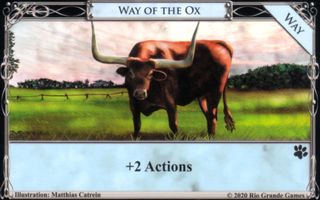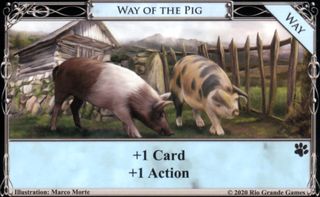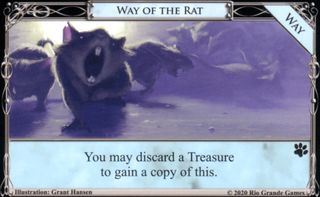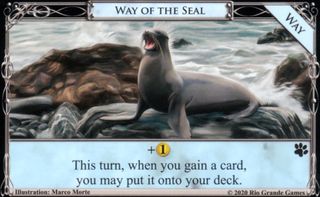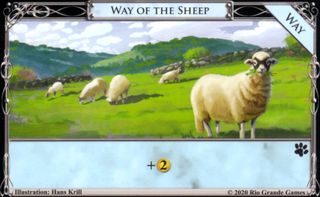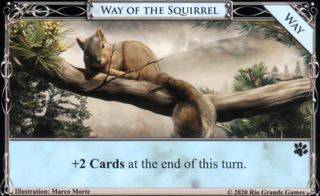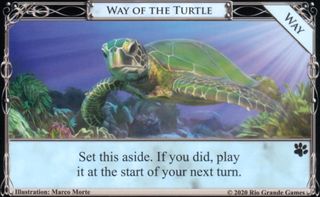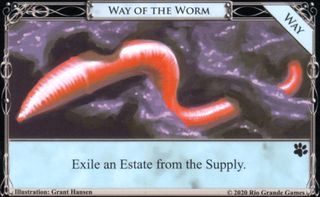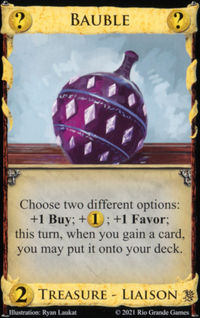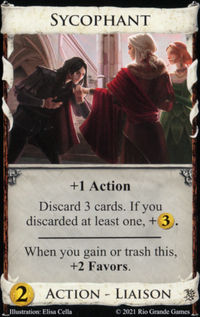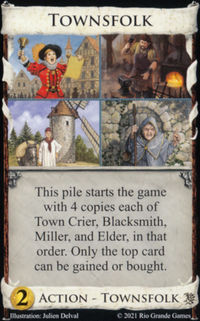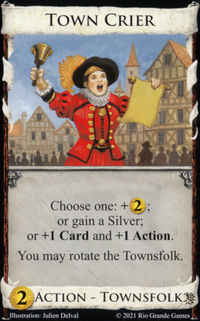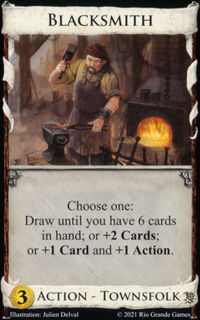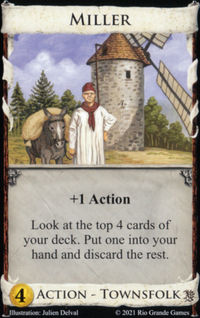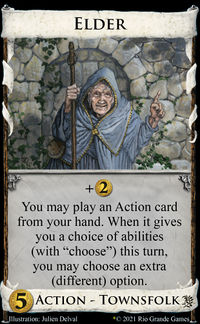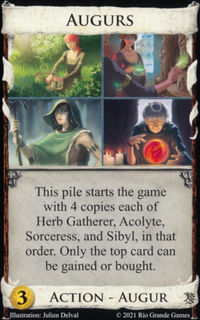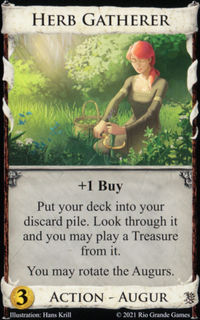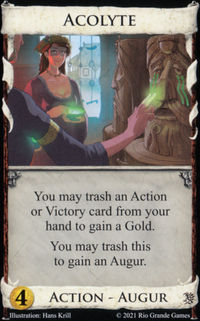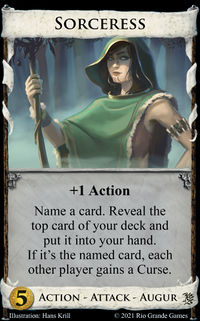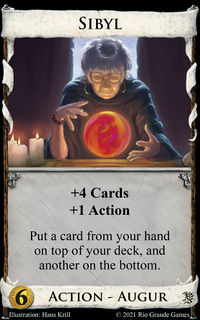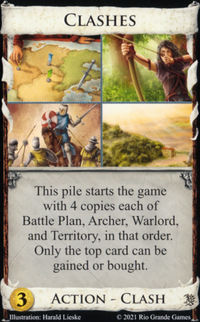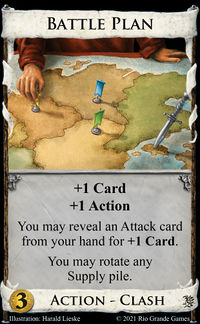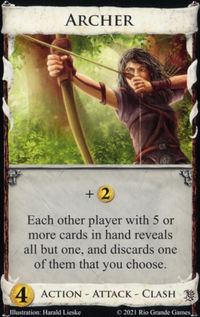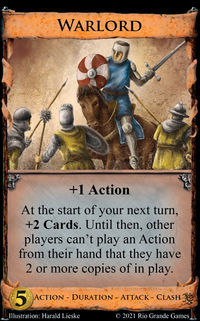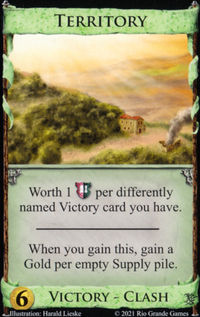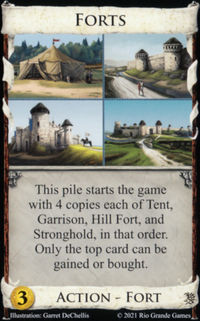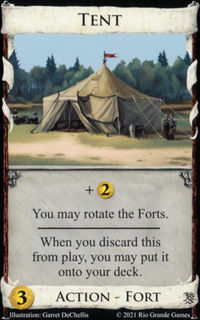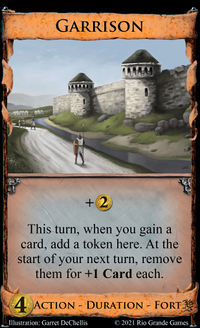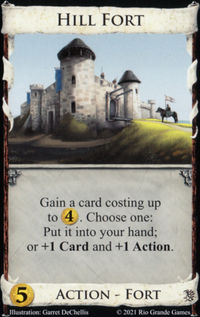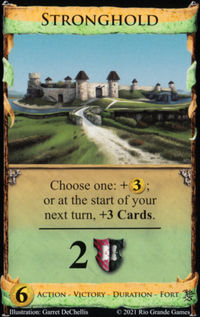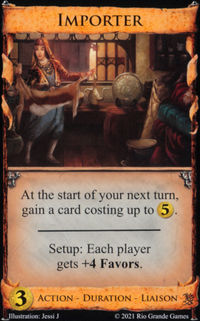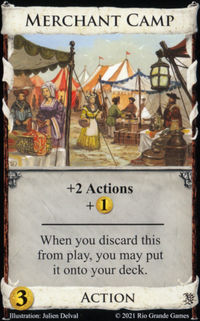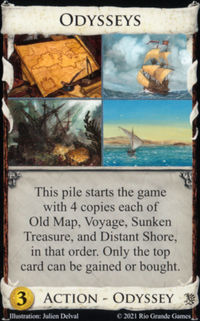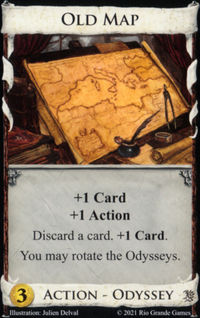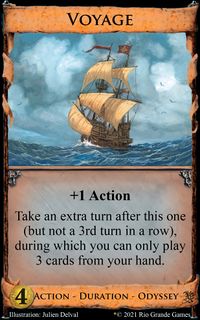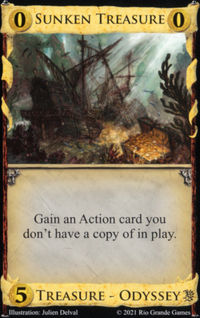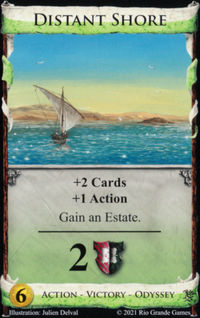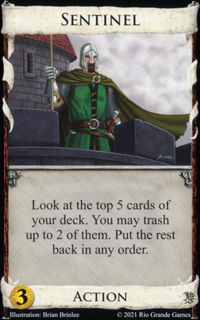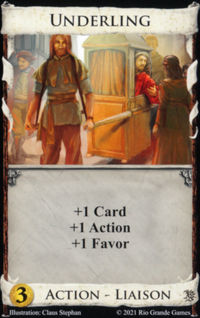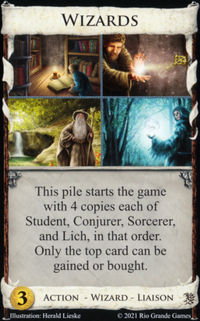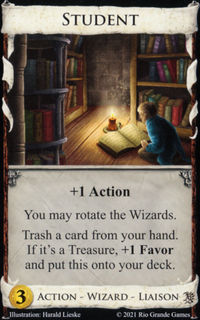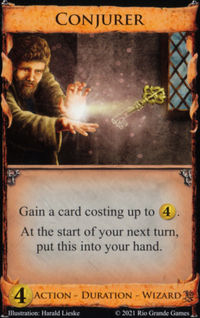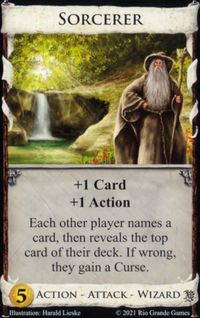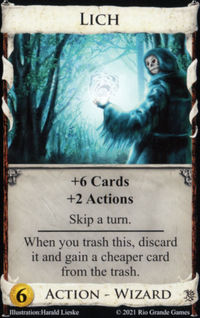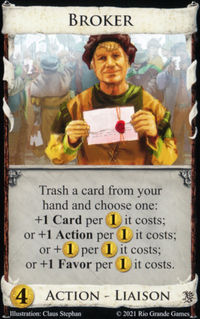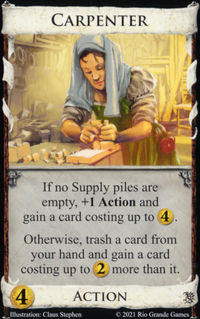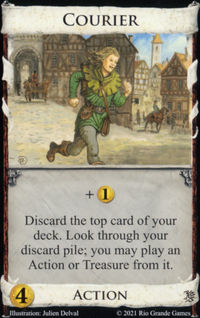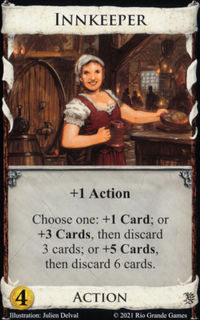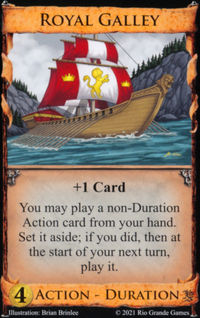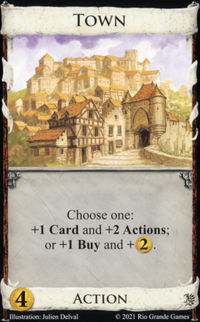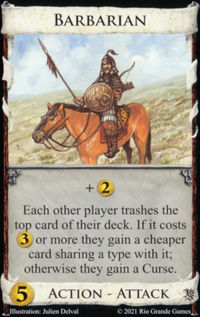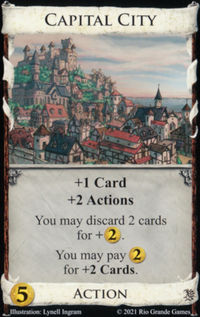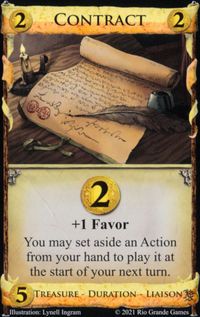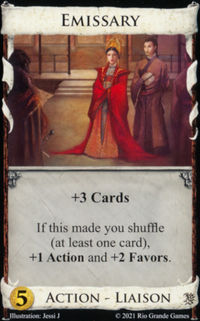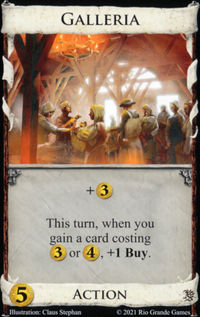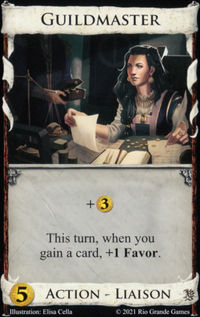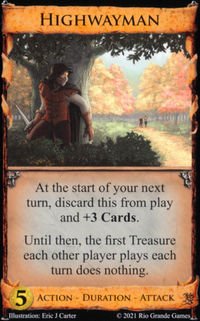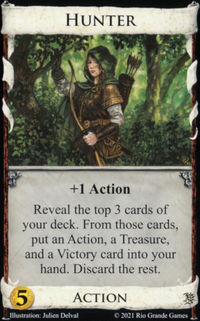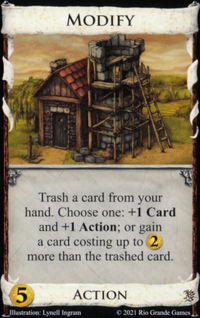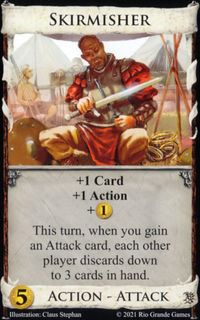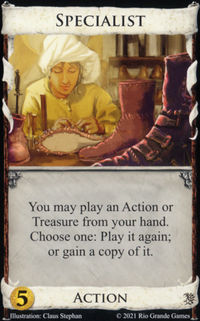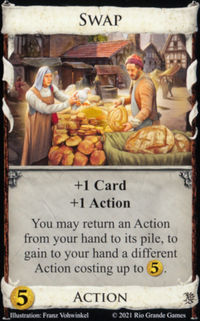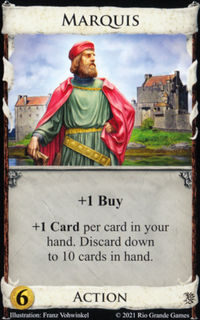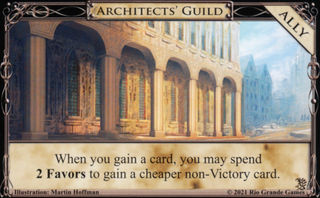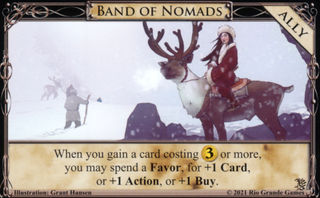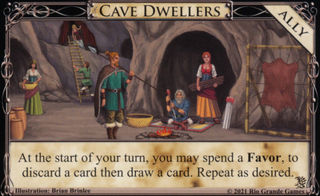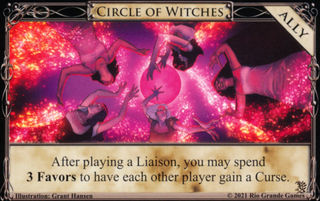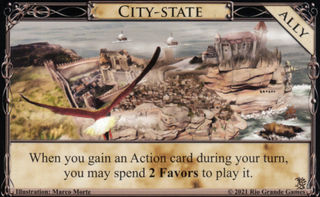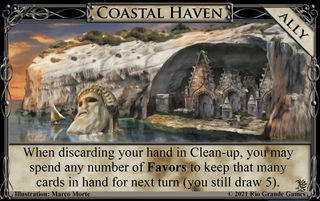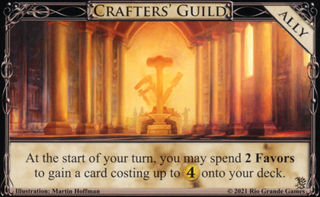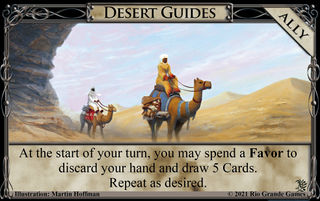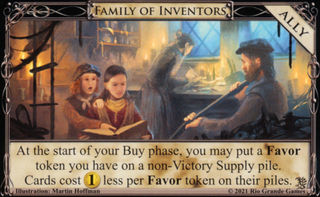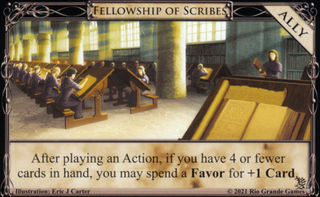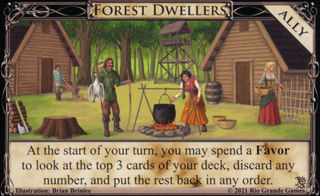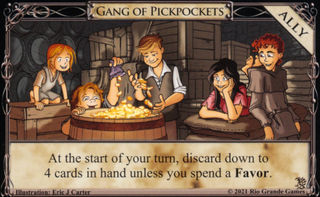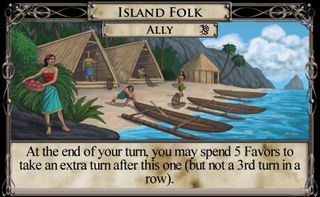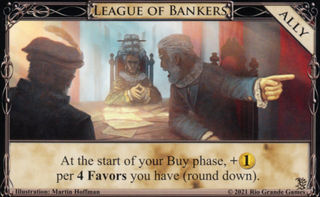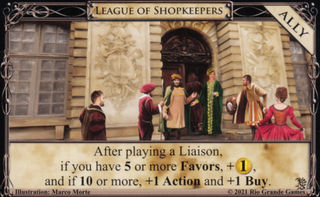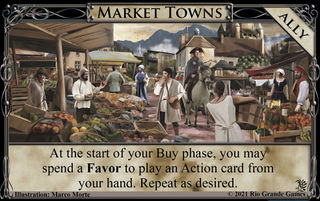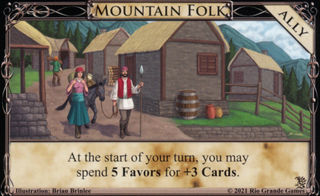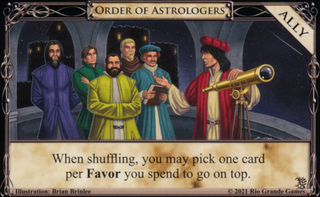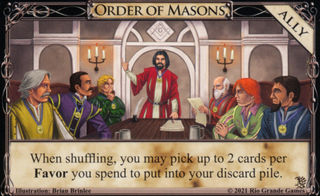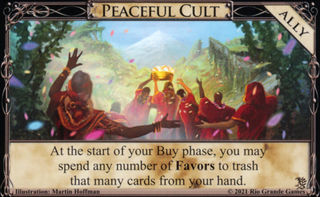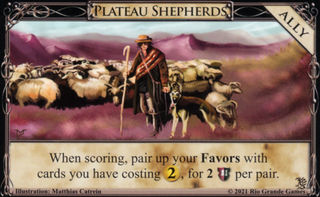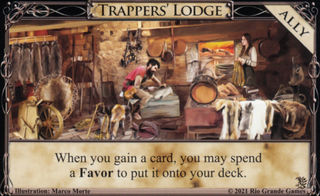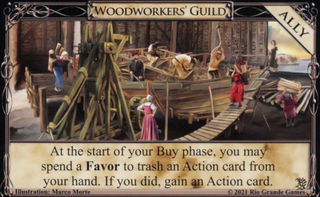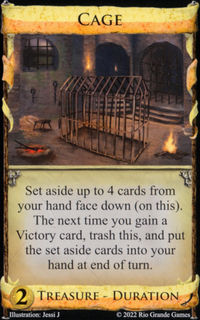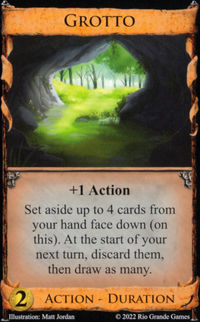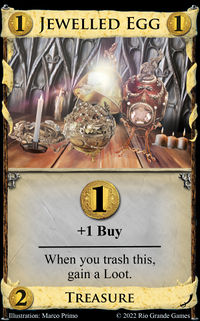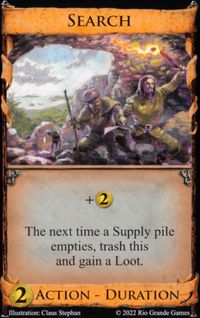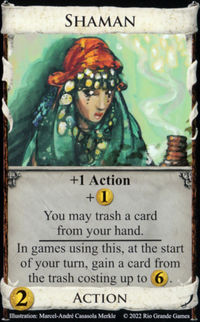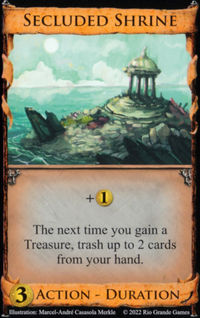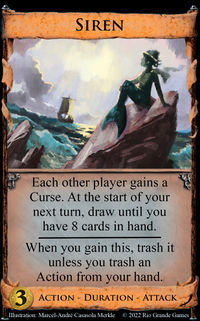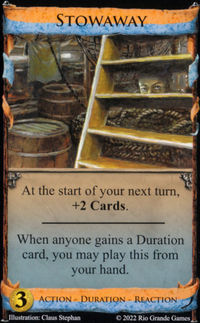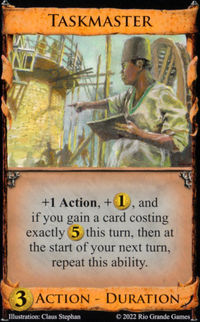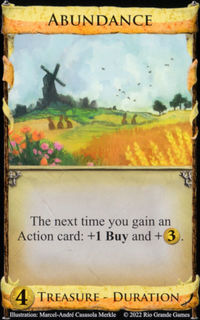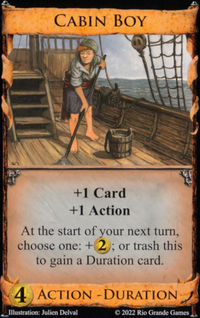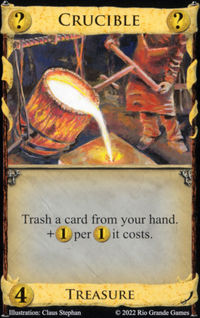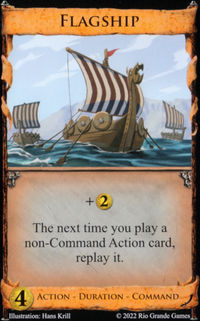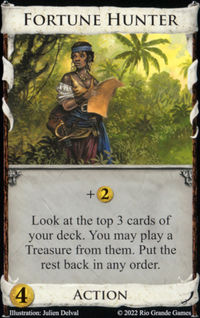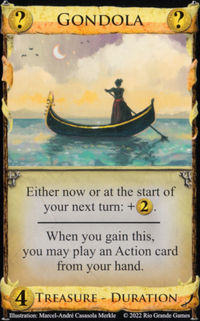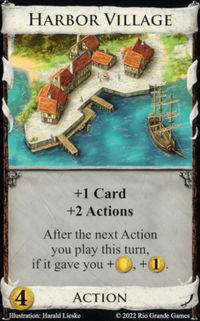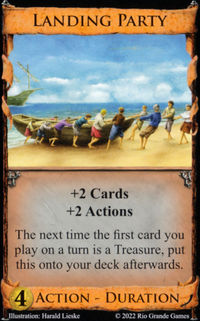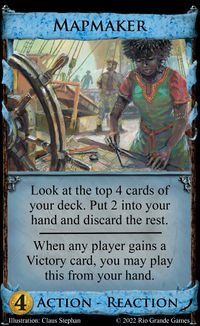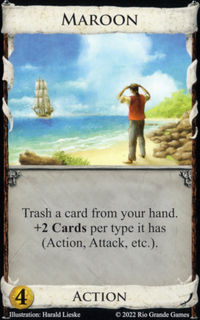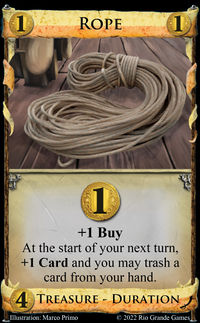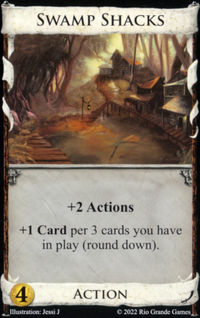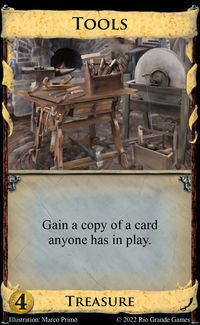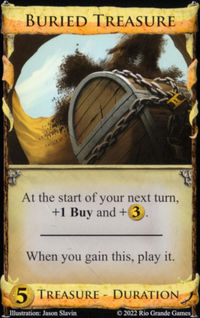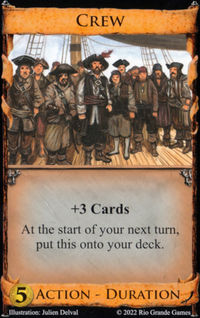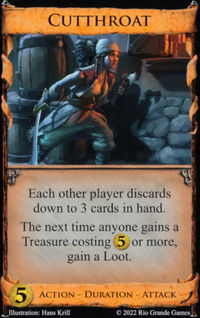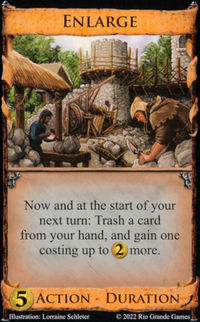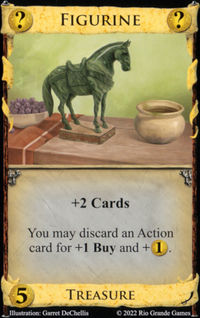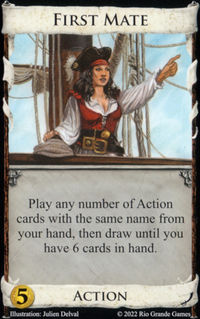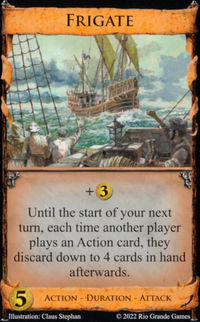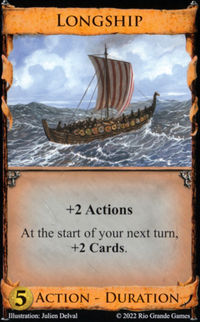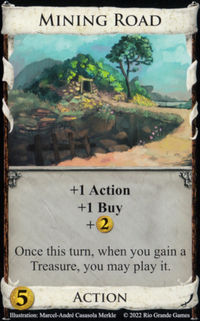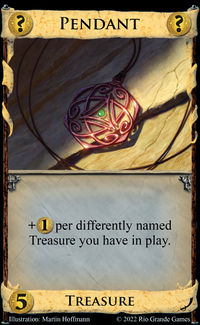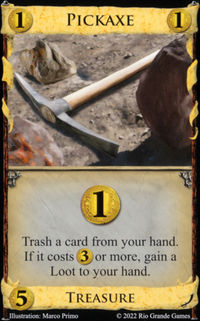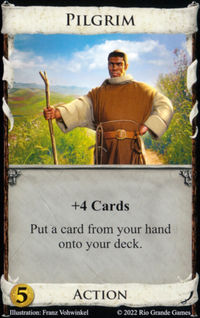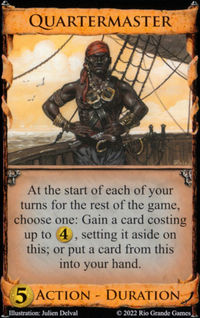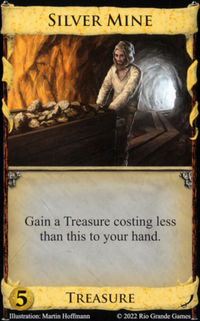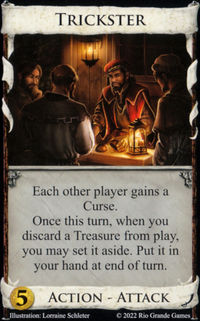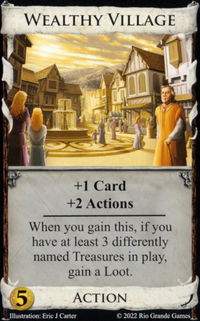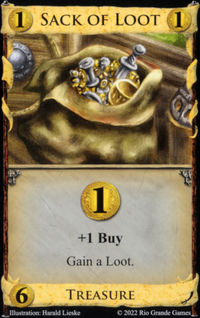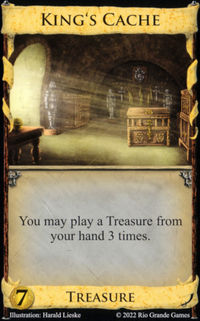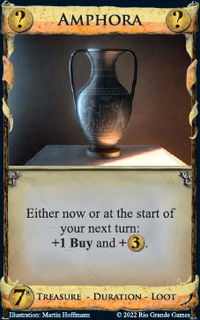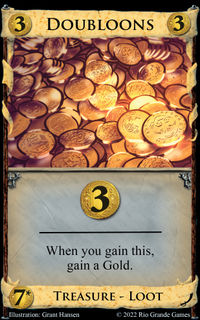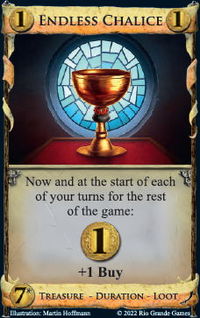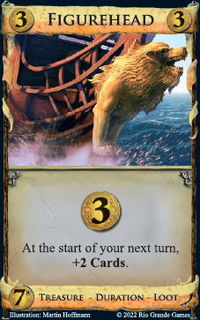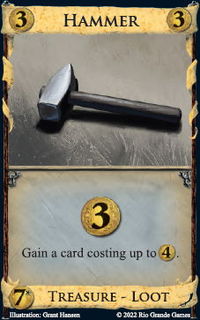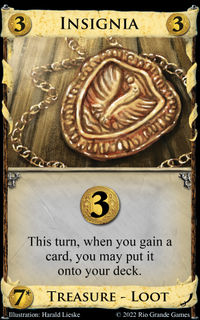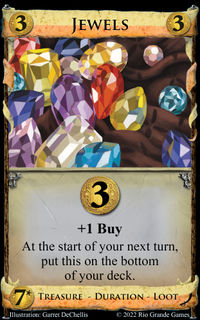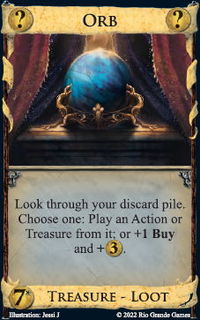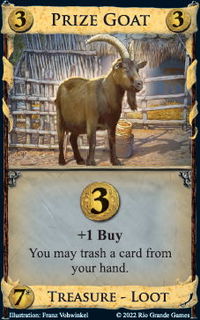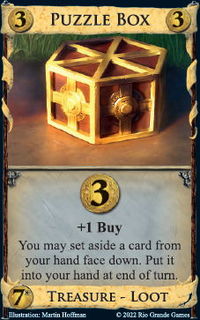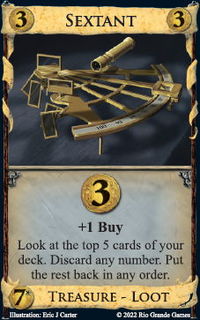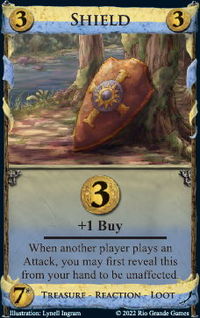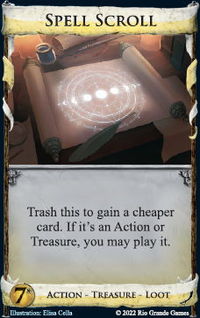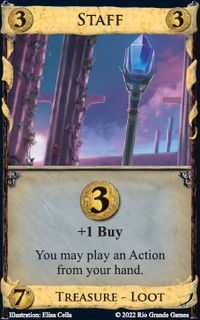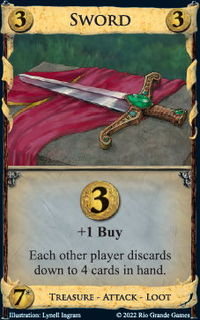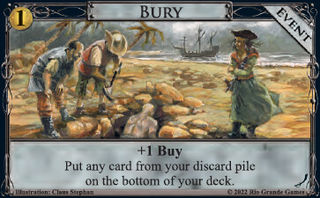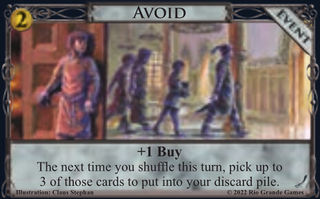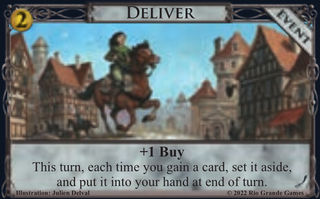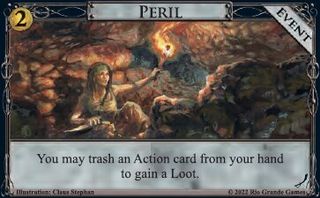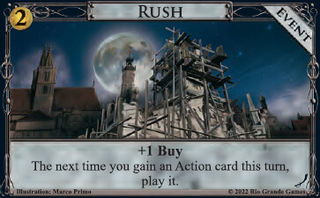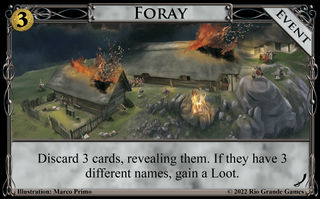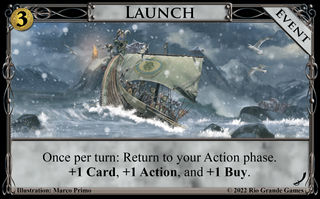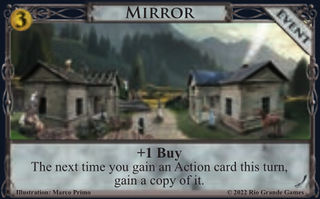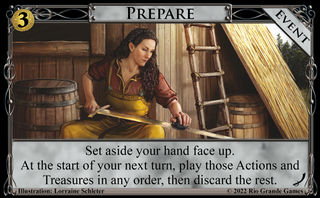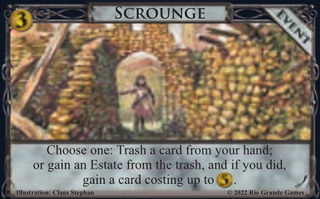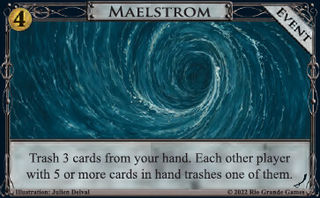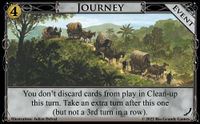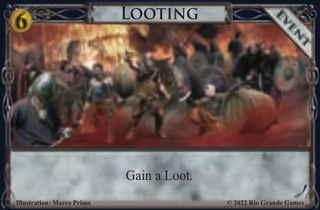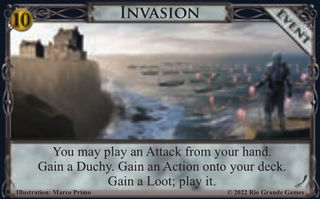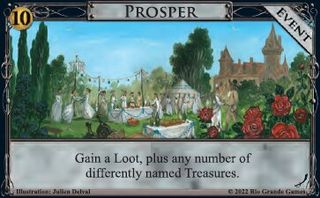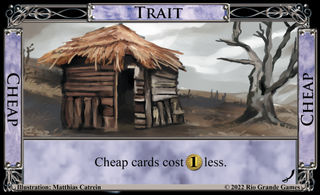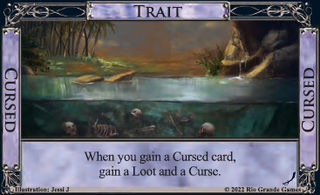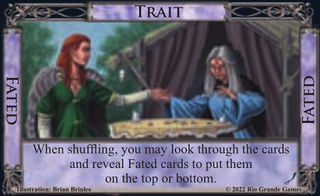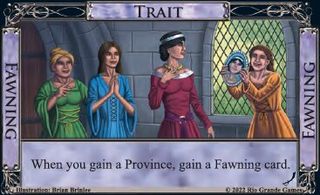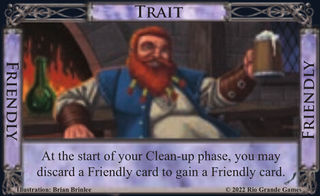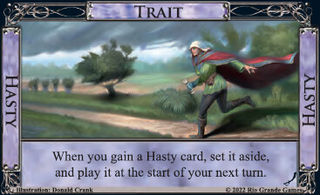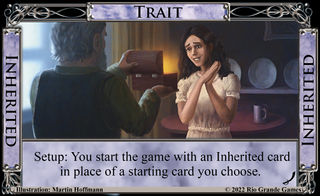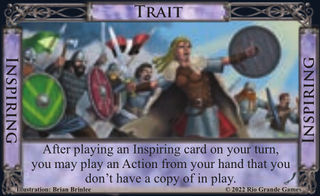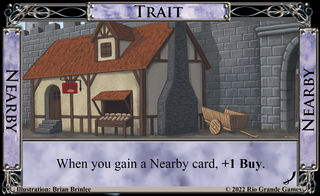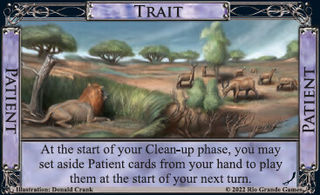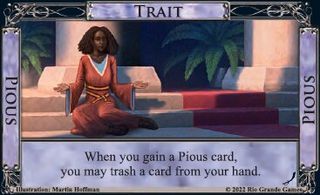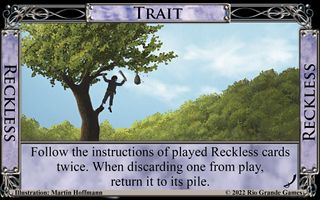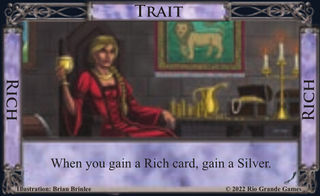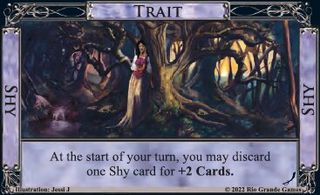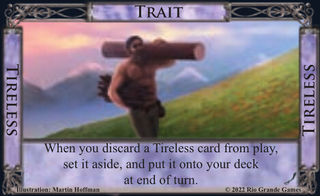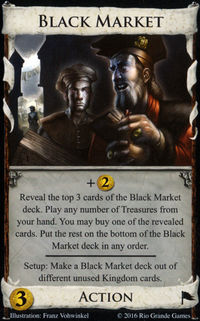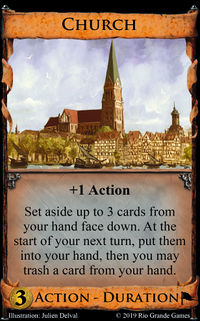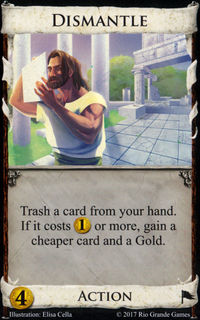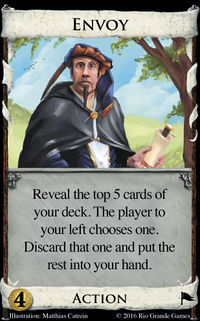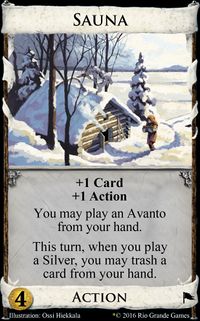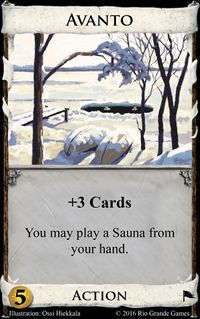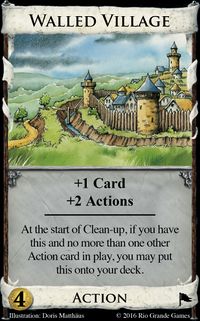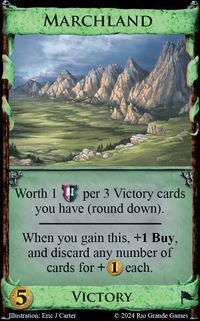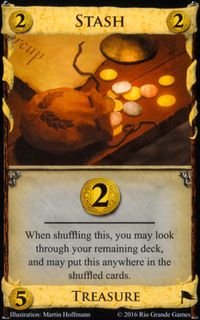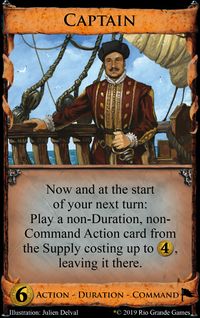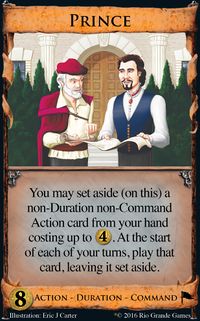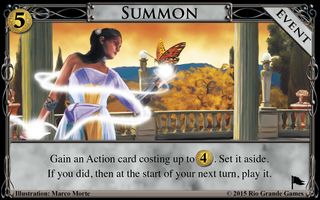Possession
| Possession | |
|---|---|
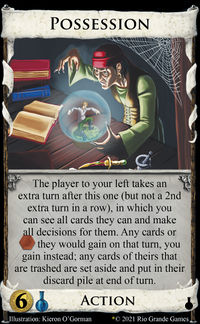 | |
| Info | |
| Cost | |
| Type(s) | Action |
| Kingdom card? | Yes |
| Set |
Alchemy |
| Illustrator(s) | Kieron O'Gorman |
| Card text | |
| The player to your left takes an extra turn after this one (but not a 2nd extra turn in a row), in which you can see all cards they can and make all decisions for them. Any cards or they would gain on that turn, you gain instead; any cards of theirs that are trashed are set aside and put in their discard pile at end of turn. | |
Possession is an Action card from Alchemy. It lets you control an extra turn being taken by your opponent and steal any cards they gain during it—so you can take advantage of their engine without having to build it up yourself. Of course, be prepared to have the same done to you.
As a card with a powerful and complicated effect that can occasionally lead to frustrating game states, Possession tends to be unpopular; for this reason, it was once treated as a banned card by default at Dominion Online. Although this is no longer the case, it is still a commonly banned card in online play.
Contents |
FAQ
Errata
Possession has received errata so that you can't take multiple extra turns in a row [1]. Here are rulings that will change as a result.
- If you play Possession multiple times in one turn, the next player can't take more than 2 turns in a row, so all Possessions after the first will fail.
- If you are Possessed, and they make you play Possession, you Possess the next player, and then take your normal turn.
Official FAQ (2018)
- You are not taking a turn with the deck of the player to your left†; that player is taking a turn, with you making the decisions and gaining the cards. The “you” in all cards still refers to the player being Possessed, not the player doing the Possessing.
- Possession has several pieces to it:
- You can see the Possessed player's cards for the entire turn, which means you will see their next hand during Clean-up. You will also see any cards they are entitled to see due to card rules; for example you can look at cards they have set aside with Native Village (from Dominion: Seaside).
- You make all decisions for the Possessed player, including what cards to play, decisions those cards provide, and what cards to buy.
- Any cards the Possessed player would have gained in any way, you gain instead; this includes cards bought, as well as cards gained due to Actions. The cards you gain this way go to your discard pile, even if they would have gone to that player's hand or the top of their deck or somewhere else. You also get any tokens that player would have gotten (this is a change from the original version of Possession). You do not get any other tokens that player would have gotten (this is a change from an earlier version). is something from Dominion: Empires; if you do not have those cards, that part of Possession's effects does not matter.
- During the Possessed turn, whenever one of that player's cards is trashed, set it aside, and that player puts it into their discard pile at the end of the turn, after Clean-up. The card is still trashed, so for example you could have them trash a Mining Village (from Dominion: Intrigue) and get the +. Getting those cards back at end of turn does not count as those cards being gained (so for example, you will not get them). Other players' cards that are trashed during that turn are not returned.
- Cards passed with Masquerade (from Dominion: Intrigue) are not being gained or trashed. Exchanging a card (such as Soldier from Adventures) does not count as gaining or trashing. Cards returned to the Supply, such as with Ambassador (from Dominion: Seaside) are also not being trashed, and so return to the Supply normally.
- If you make another player play an Attack via Possession, that Attack will hit you like it would normally. If you want to use a Reaction in response to that Attack (such as Moat), you would be the one revealing the Reaction, not the player being Possessed.
- Possession causes an extra turn to be played, like the card Outpost does (from Dominion: Seaside). The extra turn happens only after this turn is completely over - you will have discarded everything and drawn your next hand. Outpost only prevents itself from giving a player two consecutive turns, it does not prevent other cards or the rules from doing so. So for example if you play Possession in a two-player game, then after the Possession turn, that player still gets their normal turn. If they played Outpost during that turn though, it would not give them an extra turn (unless another player took a turn in between, such as via another Possession). If you play both Outpost and Possession in the same turn, the Outpost turn happens first. If you make someone play Outpost during a turn in which you Possessed them, that player will get the extra turn and make decisions during it and so forth, not you; if you make someone play Possession during a turn in which you Possessed them, that will make that player Possess the player to their left, rather than you getting to Possess anyone further. Possession turns (and other extra turns) do not count for the tiebreaker. Once the game ends, no further turns are played, including extra turns from Possession and Outpost.
- Unlike Outpost, Possession is not a Duration card. It is discarded in the Clean-up phase of the turn you played it.
- Possession is cumulative; if you play it twice in one turn, there will be two extra turns after this one.
† Some rulebooks erroneously refer to the player to your right here.
Other rules clarifications
- Possession is not an Attack, and cannot be blocked by cards like Moat.
- In a 2-player game, if you make your opponent play Possession during a Possession turn, your opponent takes their normal turn and then you next take an extra turn with your opponent making all decisions.
- If you make the Possessed player play Possession during one of their Possession turns, you finish all Possession turns of the current Possessed player and their normal turn before moving on to the next player's Possession turns. Extra turns happen in turn order.
- Possession does not give control between turns. For example, if you play 2 Possessions, then make the Possessed player play Outpost during the first Possession turn, they decide whether the next turn is the other Possession turn, or the Outpost or Mission turn.
- If you were Possessed before your normal turn, and you play an early version of Outpost or buy an early version of Mission during your normal turn, you will not take an extra turn.
- Cards that are trashed and set aside during a Possession turn are not in the trash for the rest of the turn. which may matter for Necromancer or Graverobber. If you trash a Fortress during a Possession turn, you choose to either put it into your hand, or to set it aside, at which point it stops moving.
- When they would gain a card, they do not resolve its when-gain abilities; you do. So if you make them gain a Spices, you get the +2 Coffers and not them.
- Note that some cards care if you gain a card by buying it (e.g. Haggler); these abilities will never trigger on a Possession turn. This also means that if you make them buy a card and overpay for it (e.g. Stonemason), that ability never triggers.
- Since they can't gain any cards on the Possession turn, anything that cared about how many cards were gained (such as Cauldron and Labyrinth) will never trigger.
- If a gainer cares about what card they gained, these cards didn't gain a card, and so will do nothing. For example, if you Possess someone and have them play a Replace and gain a Province, they didn't gain a Victory card, so no Curses are given out.
- If they would gain a card to somewhere other than their discard pile (e.g. they would gain a Horse onto their deck with Supplies), the gained card is instead gained to your discard pile. The exception to this rule is cards which gain themselves to a particular location (like Guardian or Den of Sin).
Strategy
Possession is a powerful and unusual card that can significantly warp a game because it effectively lets you play with and benefit from an opponent’s deck. The effect of playing a single Possession can be quite similar to just getting an extra turn; however, if you can consistently play multiple Possessions per turn with your own deck, you will make more use of your opponent’s deck than you will of your own, which distorts the game’s incentive structure considerably and can occasionally lead to stalemate-like situations if all players are able to do this. There are also various interactions that can mean Possession turns function significantly differently compared to extra turns with your own deck.
Possession is comparable to a very expensive terminal payload card—it is often best bought after you first build an engine, ideally with enough extra terminal space and draw to reliably play Possession multiple times (possibly with Throne Room variants), and can allow such an engine to come back from a ![]() deficit via extra turns. Although its effect is often very strong, Possession is extremely expensive, so it’s sometimes too slow to provide you with a significant advantage over other strategies. Not only does it require significant , its price also includes Potion; acquiring this represents a significant opportunity cost, and it’s likely that you’ll need good draw to collide it with enough . Occasionally, Possession is significantly easier to acquire with effects that allow you to gain it without adding a Potion, most notably Lurker and Transport. More generally, however, it is sometimes the case that by the time you can play Possession, you could have instead, for example, constructed a money deck that could have already bought the bulk of the Provinces.
deficit via extra turns. Although its effect is often very strong, Possession is extremely expensive, so it’s sometimes too slow to provide you with a significant advantage over other strategies. Not only does it require significant , its price also includes Potion; acquiring this represents a significant opportunity cost, and it’s likely that you’ll need good draw to collide it with enough . Occasionally, Possession is significantly easier to acquire with effects that allow you to gain it without adding a Potion, most notably Lurker and Transport. More generally, however, it is sometimes the case that by the time you can play Possession, you could have instead, for example, constructed a money deck that could have already bought the bulk of the Provinces.
An important question to answer when evaluating Possession in a given game is how much benefit you can extract from turns on which you Possess your opponent. These turns are most likely to pay off if you anticipate being able to Possess a deck that runs well and is effective (providing plenty of gains and/or scoring potential from the extra turns), or if your opponent’s deck is vulnerable to being damaged during turns on which you Possess them.
It is important to note that the impact of Possession varies according to the efficiency of your deck in relation to the deck you Possess, and the ratio in which you end up playing turns with each deck. If your deck performs better, Possession is less useful for you but more useful for your opponent to use against you. Therefore, it's often optimal for you to sabotage the quality of your own deck’s non-Possession payload once you can consistently draw and play multiple Possessions per turn, if you anticipate your opponent being able to do the same, as this means that they can extract more benefit from your deck payload than you can. This means you may want to trash your payload cards (or at least avoid adding more), spend your Coffers, and perhaps even take on as much Debt as possible, while using the payload provided by your opponent's deck to continue to build and maintain deck control (ensuring that you can keep playing your Possessions) and/or to green. If all players adopt this approach, a stalemate can sometimes be reached, in which everyone’s deck can do little but play Possession(s) and no one is incentivised to move the game forward.
Certain cards and other effects can function significantly differently on a Possession turn, and the optimal way to use them depends heavily on how many Possessions you can play—that is, whether it’s preferable for you to sabotage your opponent’s next turn (because it will be back under their control) or improve it (because this is the first of multiple Possession turns, or you anticipate consistently playing multiple Possessions on your own future turns). In some cases, you should also take care with adding the relevant cards to your deck when Possession is in the Kingdom.
- You cannot permanently trash cards from a Possessed deck, but you can use other effects to remove good cards, including that of Masquerade (which also allows you to take these cards for yourself, a very powerful effect), Island, Way of the Horse, Way of the Butterfly, and many Exile effects. Because these cards need to be in your opponent’s deck for you to exploit them, you yourself should be cautious about adding these cards to your deck. For example, if you thinned with Sanctuary in the early game, you should be aware that your opponent can use it while Possessing you to Exile your draw cards and sabotage your deck. Despite the fact that an opponent can remove cards from your deck while possessed if you have a Masquerade, Sanctuary, etc. in your deck, it is still often necessary to use deck control cards such as these while building up the deck control necessary to gain and play Possession(s). Effects such as Way of the Horse, however, are always available, and therefore such games can devolve into a race to play Possession and return your opponent’s Possession and entire engine to the Supply.
- Trash for benefit effects (such as Remodel, Apprentice, or Salvager) provide their full benefit even though the trashing is only temporary, so they have much less downside than usual during a Possession turn. For example, Remodeling a Province in your opponent’s deck is a net gain of a Province for you, rather than just milling.
- If it’s best for you to sabotage your opponent’s deck, you can use up one-shot effects (e.g. Experiment, Spoils, or Sinister Plot) even if they don’t particularly benefit the turn. This also applies to stockpiled Coffers and Villagers.
- If your opponent’s next turn is not under your control, you can misuse or ignore effects for topdecking and shuffle management to decrease rather than increase consistency, with the aim of causing a dud for your opponent. You may, for example, topdeck junk with Courtyard or by buying cards while under the effect of your own Haunted Woods; decline to use the topdecking effect of Scheme or Alchemist; or use Pursue to ensure a partial hand of Victory cards. With many discarding effects, you may be able to discard bad cards then trigger an unfavorable reshuffle.
- Attack cards whose attack component is mandatory present trade-offs during a Possession turn, although sometimes you may not mind the damage done to your own deck, particularly if you anticipate that your next turn will be under your opponent’s control. For example, with Militia, you might need the it generates to afford Province and have junk to discard from your own hand, or you might actively want to cause a dud for your opponent’s incoming Possession play. The latter, however, can be risky if your opponent simply opts to not play their Possession, essentially producing a game of chicken. Outside of Possession turns, it’s also worth considering whether attacking with a junking Attack such as Witch is wise if you also plan on using Possession, as you’re lowering the quality of the deck you would like to use.
- Conversely, on-play “penalties” in which you also give your opponent a benefit, like those of Governor, Council Room, or Sacred Grove, can benefit you rather than acting as penalties when you play them while Possessing your opponent.
- Effects that provide a benefit on a subsequent turn (e.g., Duration cards such as Wharf and Reserve cards such as Transmogrify) can be a double-edged sword. Duration cards are useful when you can control more than one of your opponent’s turns consecutively. Otherwise, however, you may wish to avoid playing them during a Possession turn; the same applies during your own turn, if you anticipate your opponent Possessing you. Similarly, the best state in which to leave Reserve cards (on or off the mat) depends on who is most likely to reap the benefit of them next. Finally, similar considerations also apply to Travellers, in that you’re unlikely to want to exchange them for your opponents.
- Accumulating can be a useful way to ensure your opponent can get little value out of your deck. Because you take on the associated with cards played or purchases made while Possessing your opponent, it can be a good idea to buy e.g. Royal Blacksmith or Donate, with no intention of paying off the debt. This way, you can continue to play your primary payload in Possession and gain cards by using your opponent’s deck.
- Victory tokens are not redirected during Possessed turns, and so decks using effects such as Monument and Collection are less vulnerable to Possession. If you are Possessing such a deck, you’ll need to judge whether it’s worth playing such cards, as while doing so may allow you to afford a card, it will also give your opponent free
 .
.
- Interactions between Possession and other extra turns need to be considered carefully. For example, Outpost is significantly weaker than usual, because it doesn’t work when you play it on your own turn immediately after being Possessed.
External strategy articles
Note: Article(s) below are by individual authors and may not represent the community's current views on cards, but may provide more in-depth information or give historical perspective. Caveat emptor.
Versions
English versions
| Digital | Text | Release | Date | |
|---|---|---|---|---|
 |
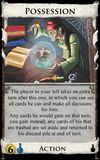 |
The player to your left takes an extra turn after this one, in which you can see all cards he can and make all decisions for him. Any cards he would gain on that turn, you gain instead; any cards of his that are trashed are set aside and returned to his discard pile at end of turn. |
Alchemy | May 2010 |
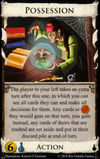 |
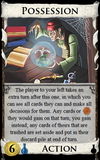 |
The player to your left takes an extra turn after this one, in which you can see all cards they can and make all decisions for them. Any cards or they would gain on that turn, you gain instead; any cards of theirs that are trashed are set aside and put in their discard pile at end of turn. | Alchemy (2018 printing) | December 2018 |
 |
The player to your left takes an extra turn after this one (but not a 2nd extra turn in a row), in which you can see all cards they can and make all decisions for them. Any cards or they would gain on that turn, you gain instead; any cards of theirs that are trashed are set aside and put in their discard pile at end of turn. | Extra turn errata | December 2023 |
Other language versions
| Language | Name | Digital | Text | Notes | |
|---|---|---|---|---|---|
| Chinese | 佔據 (pron. zhànjù, lit. to occupy) | ||||
| Czech | Posedlost | ||||
| Dutch | Bezeten | ||||
| Finnish | Riivaus | ||||
| French | Possession |  |
Le joueur à votre gauche joue un tour supplémentaire après celui-ci, pendant lequel vous voyez ses cartes et prenez les décisions pour lui. Vous recevez à sa place les cartes et jetons qu'il aurait reçus ; ses cartes écartées sont mises de côté et placées dans sa défausse à la fin de son tour. | ||
| German | Besessenheit | 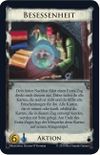 |
Dein linker Nachbar führt einen Extra-Zug direkt nach diesem aus. Dabei siehst du alle Karten, die auch er sieht und du triffst alle Entscheidungen für ihn. Alle Karten, die er nimmt oder kauft, erhältst du. Karten, die in diesem Zug entsorgt werden, werden zur Seite gelegt. Am Ende des Extra-Zuges legt der Mitspieler diese Karten auf seinen Ablagestapel. |
(2014) This version is listed here. One other version is listed here. | |
| Besessenheit | 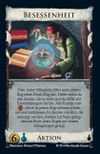 |
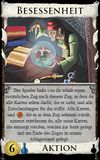 |
Dein linker Mitspieler führt nach diesem Zug einen Extra-Zug aus. Dabei siehst du alle Karten, die er sieht und du triffst alle Entscheidungen für ihn. Alle Karten oder , die er in jenem Zug nehmen würde, nimmst stattdessen du; Karten von ihm, die entsorgt werden, werden zur Seite gelegt und am Ende jenes Zuges auf seinen Ablagestapel gelegt. | (2019) | |
| Besessenheit | 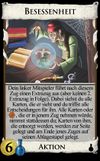 |
Dein linker Mitspieler führt nach diesem Zug einen Extrazug aus (aber keinen 2. Extrazug in Folge). Dabei siehst du alle Karten, die er sieht und du triffst alle Entscheidungen für ihn. Alle Karten oder , die er in jenem Zug nehmen würde, nimmst stattdessen du; Karten von ihm, die entsorgt werden, werden zur Seite gelegt und am Ende jenes Zuges auf seinen Ablagestapel gelegt. | |||
| Italian | Possessione | ||||
| Japanese | 支配 (pron. shihai, lit. domination) | 左隣のプレイヤーはこのターンの後に追加の1ターンを得る。そのターン、あなたはそのプレイヤーが見ることができるカードをすべて見ることができ、そのプレイヤーの代わりにすべてを決定する。また、そのプレイヤーが獲得しようとするカード・卜ークンは、あなたが代わりに獲得する。 さらに、廃棄されるそのプレイヤーのカードは脇に置き、ターン終了時に捨て札置き場に置く。 | |||
| Polish | Opętanie | Although Polish version is not released, this name is referred to in Polish Dominion 2E rulebook. | |||
| Russian | Одержимость (pron. odyerzhimost') | ||||
| Spanish | Posesión | 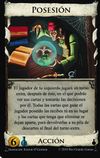 |
El jugador de tu izquierda jugará un turno extra, después de éste, en el que podrás ver sus cartas y tomarás las decisiones por él. Todas las cartas que gane el jugador poseído las recibes tú en su lugar y las cartas que tenga que eliminar se dejan aparte, para devolverlas a su pila de descartes al final del turno extra. | (2010) |
Trivia
Possession is the card which has the longest FAQ.
Preview
Secret History
Retrospective (2012)
Retrospective (2017)
Possession is also hated by some people. I like to say, if there were no cards people hated, there would be no cards people loved. But well. You have to consider things case by case anyway. Maybe something is too hated by the people who hate it, or hated too often. Mostly I have not felt like this is the case with Possession - instead again I think the confusion is the big problem. But. I don't have market research really. Maybe it's too hated. It's not like the game has to have that particular concept. If time had permitted I would have tried other big effects for that slot, because it was in fact clear that the card was confusing; time did not permit. A lesson in what to do when people say "we need this fast."
I always think that kids in particular like Possession, but I don't know that they need that particular thing to get that particular joy. Smugglers for example may be doing the trick. They (in my imagination with no market research) want to be rewarded for Mom being better at the game than them; that doesn't require taking a turn with her deck.Donald X. on "fixing" Possession
Why doesn't Possession limit itself?
